From Rwanda, Term 5
... if anyone (of my friends only, of course) is still following this.
For anyone (of my friends only, of course) who missed the first four terms, from August 2009 to November 2010, the entries, and especially the photos, are still available, for August to November 2009 and for January to November 2010. I will occasionally add to the page of maps and aerial photos.
16 January 2011:I hope the new year has started well for everyone – as it has for me. After a great eight-week holiday, I arrived back almost two weeks ago, on Monday evening, and was met by Pascal and Benjamin at the airport. School started the next day, with a four days of staff training sessions, mostly run by two Canadians who used to work with/under Ron, the Headmaster.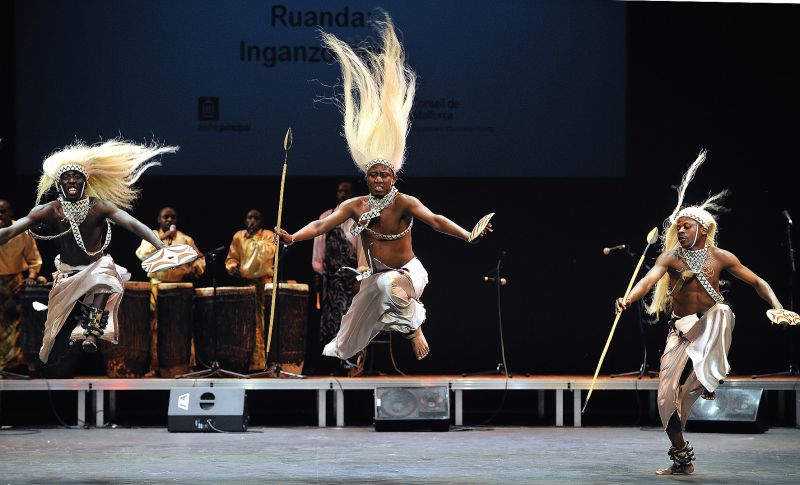
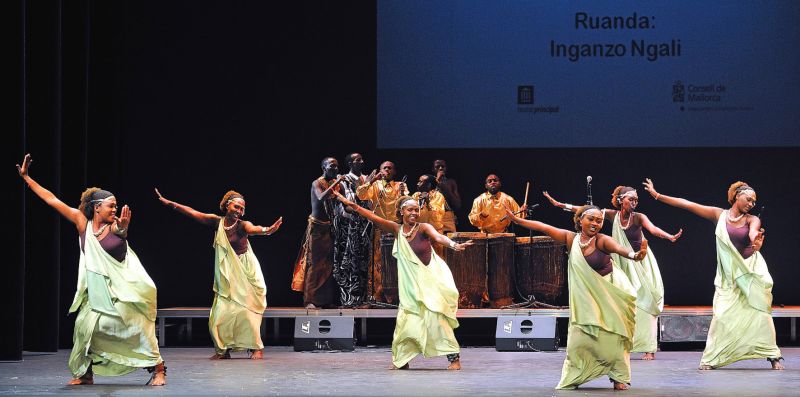 A lot more fun, and useful, than staff training that I had undergone in the past, this actually addressed teachers' problems in the classroom. Came home late twice that week, after a dinner with the guests and a party on Friday, which included a performance by the second best traditional dance group in the country, which is run by one of our teachers. What is striking about many of the dances, (as I think I have noted in another place) especially by the men, is the way the upper body floats over a stomping and jumping lower body and legs. – Having avoided beer for the whole of the break, I now have it occasionally, as usually the only alcohol on offer.
A lot more fun, and useful, than staff training that I had undergone in the past, this actually addressed teachers' problems in the classroom. Came home late twice that week, after a dinner with the guests and a party on Friday, which included a performance by the second best traditional dance group in the country, which is run by one of our teachers. What is striking about many of the dances, (as I think I have noted in another place) especially by the men, is the way the upper body floats over a stomping and jumping lower body and legs. – Having avoided beer for the whole of the break, I now have it occasionally, as usually the only alcohol on offer.
Not only is B now staying with us, probably for the year, but we have also had a number of visitors already. Laurien was here for a few days, and another friend of P's/ours, Roger, who is 21 and in grade 6, studying construction: some of the courses for the National Exams combine academic courses, like maths, and vocational training. Talking of visitors, the big news is that Britta, my sister, will be coming to Rwanda on Wednesday this week, for six weeks, her first time in Africa, though she will not be staying here most of the time – she says – but wants to spend time on her own.
Things have been very busy at school too: slightly better organised than last year, I feel, but the number of students is much greater – so much so that after one week we have had to redesign the timetable! And I have continued, on Saturdays, to teach English to that 'special' group of parliamentarians. In one of the sessions, one of the things I got them to do was to spot the mistakes in the 'Sylbas' for the General Paper, published by the Ministry of Education, that I have mentioed before, and to rewrite it properly – perhaps very slighly risky, but is was fun and worked well. I might try something on corruption for my last session, although the main emphasis is on language, of course.
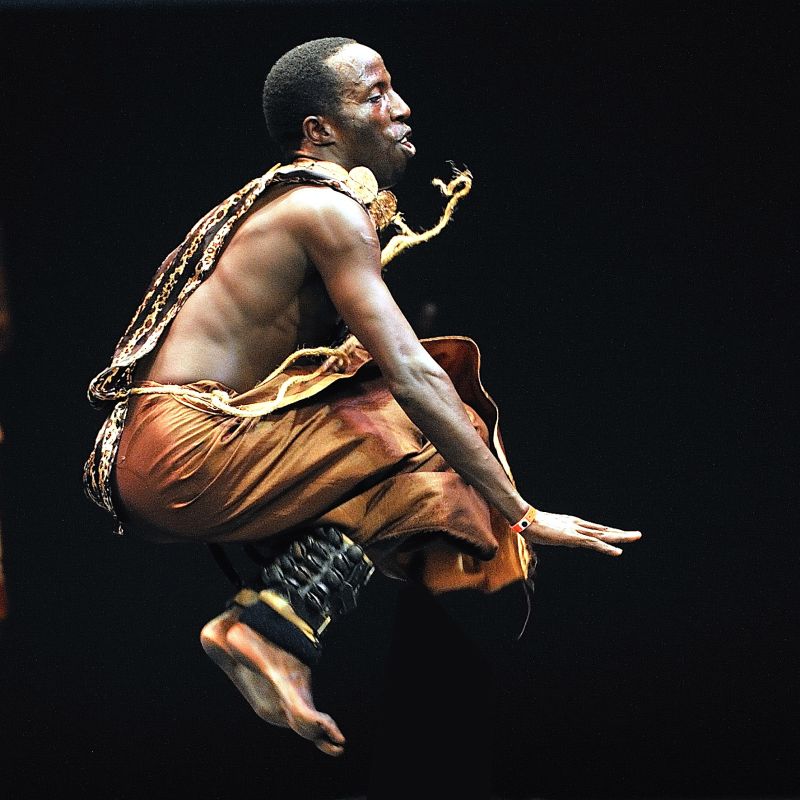 I went swimming for the first time today, it has been a bit cooler and wetter than it was last year, and was pleased that I had no problems, despite my bike accident in Berlin just over two months ago (which I suppose everyone who reads this page knows about.)
I went swimming for the first time today, it has been a bit cooler and wetter than it was last year, and was pleased that I had no problems, despite my bike accident in Berlin just over two months ago (which I suppose everyone who reads this page knows about.)
[Thanks to Serge for the pictures, which were taken at a folk dance festival in Europe where his group won first prize. The dancers in the group that performed for us were probably the 'youth team', but very good.]
30 January 2011: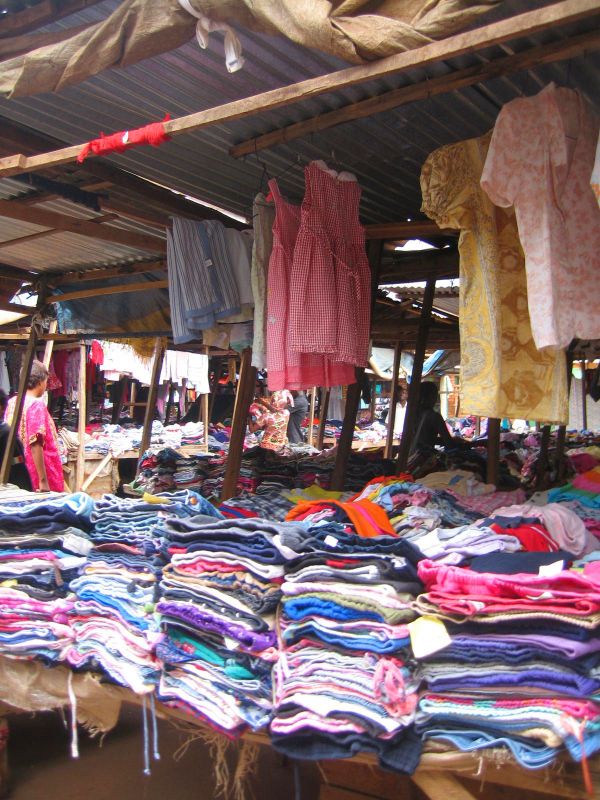
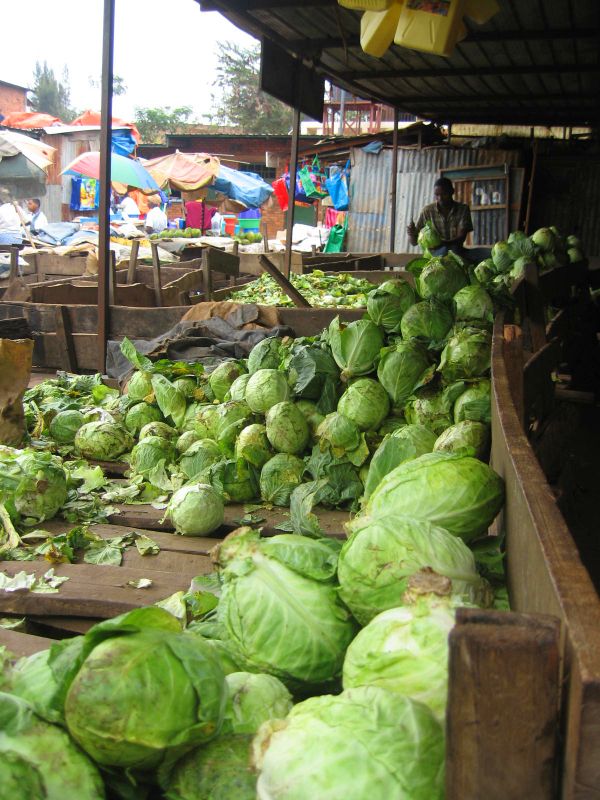 Britta arrived the week before last, and was picked up by B at the airport, as I was at school, (chairing meetings, in fact: but it was also nice that she first met a friend of mine separately from me.) She came to school for a day, came swimming at the Mille Collines with me, went to the market on her own, cooked some of the meals for us (including potatoes and eggs in Senfsosse: mustard was a new flavour to the other two) and she met some of my friends here, but then on Monday last week she took off on her own – by now she has already spent more time in Rwanda outside Kigali than I have! One reason she came, and wanted to spend six weeks here, was to spend time by herself, away from where she has been before (– the trip is paid for by the commune, so she has been taking pictures partly to be able to share her experiences with the others after she has returned. These pictures are hers.)
Britta arrived the week before last, and was picked up by B at the airport, as I was at school, (chairing meetings, in fact: but it was also nice that she first met a friend of mine separately from me.) She came to school for a day, came swimming at the Mille Collines with me, went to the market on her own, cooked some of the meals for us (including potatoes and eggs in Senfsosse: mustard was a new flavour to the other two) and she met some of my friends here, but then on Monday last week she took off on her own – by now she has already spent more time in Rwanda outside Kigali than I have! One reason she came, and wanted to spend six weeks here, was to spend time by herself, away from where she has been before (– the trip is paid for by the commune, so she has been taking pictures partly to be able to share her experiences with the others after she has returned. These pictures are hers.)
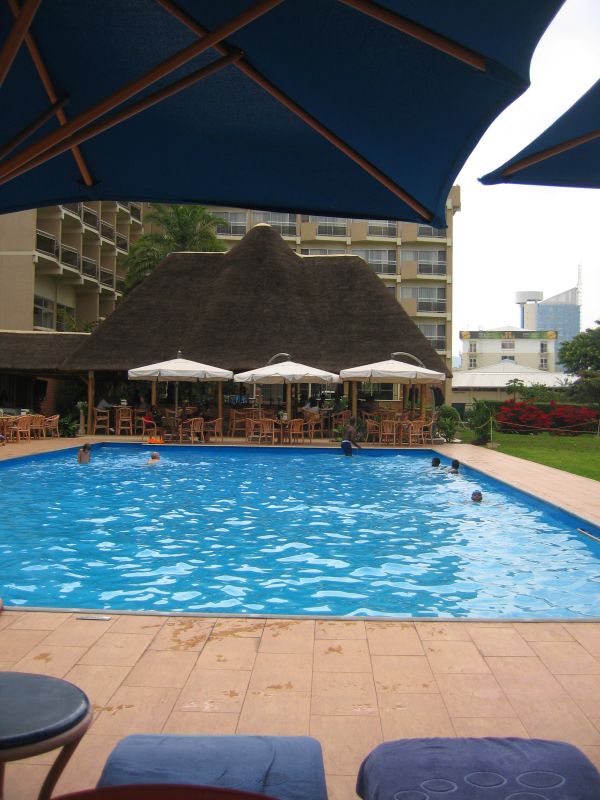
The building in the background has just been finished and is the tallest in Kigali: "We are getting a skyline," someone said.
Saturday morning. The motorbike is Daniel's: the driver had to leave it at our place for the 7th Day Adventists' Sabbath.
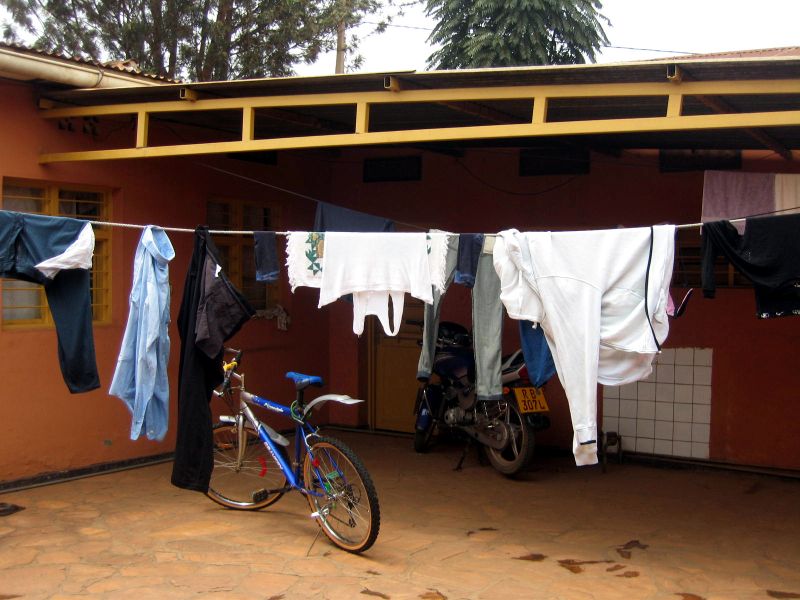
P's school has started again properly, – it took more than a week for all the teachers to come to classes and so on – and we are spending some time on C++ and maths, sometimes with Ayubu again. JD (Jean de Dieu), one of our 'charges' and L's older brother, got his examination results last week and had done very well, so he will now go to his old school to find out which school has offered him a place for the last three years of secondary school. But B is still waiting for his results in the National Examinations, and is looking for work – in Rwanda he can only start university in a year's time: this is clearly not well organised here! For now he has at least taken up karate again, three times a week.
20 February 2011:It's been quite a long time since the last time I wrote.
After ten days away on her own in the North of the country, in an area of lakes and – of course! – hills, Britta came back for a few days two weeks ago, apparently greatly enjoying her holiday and time away from everything. The pictures were taken on Sunday morning, after we had had 'breakfast in bed'. The guys at the other end of the bed are P and R: they had shared a bed for a year in P3 when they were in the same boarding school, but now R is a year ahead, because P had had to drop out of school for a year; (that is when he was working in the place where I lived in my first term here and I met him.) He had come to visit us a few weeks before, on his way to school, but when he came this time he was not in a good state: he had been home, and apparently hardly ventured outside the house where he lives with his mother, after having been sent away from school because he was unable to pay the school fees. He had not even told his closest local friend! – people, not just here of course, are ashamed of being poor as if it was a moral failing. Until last year, his fees had been fully covered by FARG, the organisation supporting genocide survivors, but they have recently bumped people off their list who have some relatives who might be able to pay for them. But R's mother is a primary school teacher, now working at an orphanage, and had only been able to raise half the fees for the term, so he has become another student whose school fees I/we are – in this case: partly – paying, who otherwise would have had to drop out of school.
This afternoon P was about to go to the funeral of a still quite young, nationally known teacher at his school who suddenly died yesterday – until he heard that the football match against another school, in which A was playing, had not been cancelled. There were not many spectators, he said, most people from the school having gone to attend the funeral instead. (Apparently, if I died in this country, there would be hundreds of mourners at mine too!) – I think I mentioned before that whereas in Kenya and Uganda they tend to delay funerals by at least a few days, or even more than a week, despite all the associated extra costs, to allow everyone who wants to attend to come, here they tend to bury people quickly.
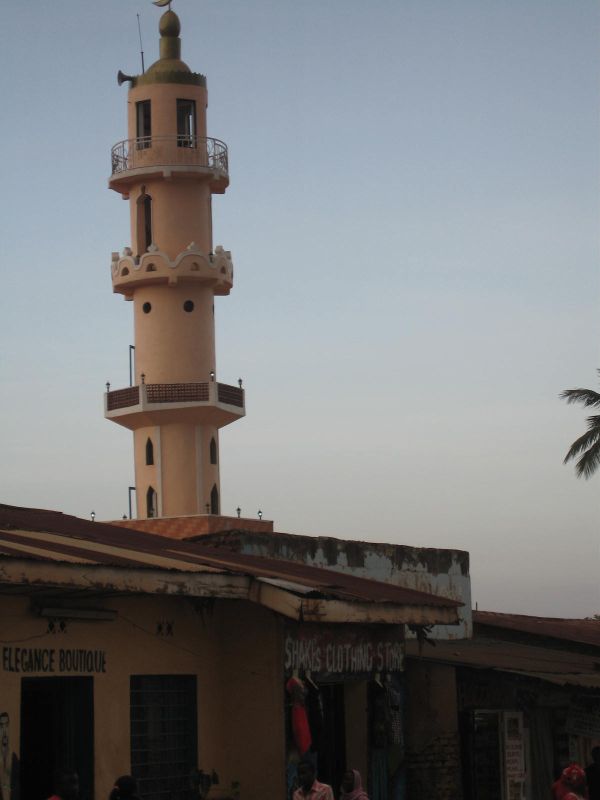 There are other areas too, apart from cutting down on the spending on the education of genocide survivors, where it seems to me the government's policy is heavy-handed, even unfair. Officials of the local administrations have been going around in the villages, destroying the traditional thatch or banana-leaf roofs that many buildings still have. If the building was a family's residence, assistance was available to put on metal sheeting instead, but if it was just the outside kitchen, as in the case of P's grandfather, there was no compensation at all. Not only does such a policy reflect a very limited view of development, as if development meant becoming 'modern' and Western rather than having to do with freedom and quality of life; the top-down approach also only changes appearances, and can lead to genuine hardship and give rise to resentment. (I may of course have misunderstood the policy and have been misinformed about its implementation – but if I have, despite trying to find out and wanting to believe the best, then there is still a serious problem.)
There are other areas too, apart from cutting down on the spending on the education of genocide survivors, where it seems to me the government's policy is heavy-handed, even unfair. Officials of the local administrations have been going around in the villages, destroying the traditional thatch or banana-leaf roofs that many buildings still have. If the building was a family's residence, assistance was available to put on metal sheeting instead, but if it was just the outside kitchen, as in the case of P's grandfather, there was no compensation at all. Not only does such a policy reflect a very limited view of development, as if development meant becoming 'modern' and Western rather than having to do with freedom and quality of life; the top-down approach also only changes appearances, and can lead to genuine hardship and give rise to resentment. (I may of course have misunderstood the policy and have been misinformed about its implementation – but if I have, despite trying to find out and wanting to believe the best, then there is still a serious problem.)
There has continued to be too much rain for the season, and I have continued to have a lot to do: the Primary School has decided to adopt my report-writing system, and I have been asked to design a 20-hour SAT Strategies course that will be taught on Saturday mornings, by me and some American teachers, at the language school which is based at the school where I work during the week.
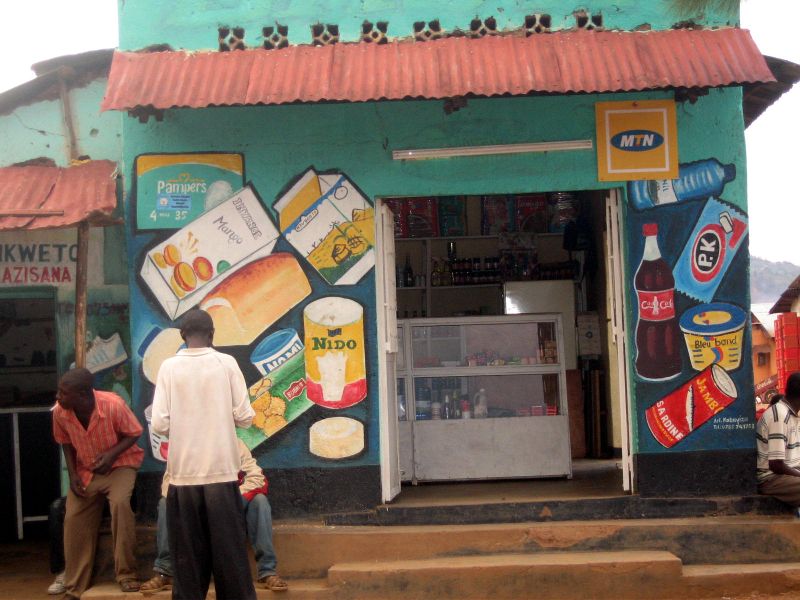
These pictures were taken by Britta in Milongwine (meaning "40"), a lively and, I have been told, largely Muslim business area not far from where we live.
Gacaca means "reconciliation", and the local Gacaca courts, based on the traditional justice system, have played a major part in resolving the anger after the genocide, a bit like the Truth and Reconcilliation Commission in South Africa after apartheid. (Some of what I know about this I read in IB Extended Essays: the role of these courts is a popular topic amongst the Rwandan students at the school.) But nowadays they mostly deal with other local conflicts – such as that between L and his older sister, which started when she turned up unannounced, late one night, to move back into the house where he has been living alone since the death of their mother, and which ended with them having physical fights. L's reaction came as a surprise to us: even P and B, who have known him all his life, had not seen him lose his temper like that. So he and his sister were ordered to appear in court on Saturday, and the matter seems to have been resolved, (although it had in fact been settled amicably by P already, as he had some long phone conversations with them.)
13 March 2011:Work has been rather unrelenting for the past three weeks, especially with the Principal having had to go back to India. She we will be back tomorrow, but the remaining three weeks of the term don't look much better, since I need to get the lists ready for the end-of-term reports (– the programming part doesn't require much effort anymore.) I have been quite lucky that my 'students' in parliament have been too busy the last few weeks: local elections, a retreat, umuganda (= the morning of community service on the last Saturday of each month,) but in one week the SAT Strategies course that I was asked to plan will start, for six Saturday sessions. ["Moan, moan, moan," I can hear you say. Sorry. – I am ready for the two-week break at the start of April: UK, Switzerland and Berlin.]
Before Britta left two weeks ago, she came to visit us for four more days, and on one of those days we went to 'the village'. A very nice day, a lot of people talked to us, and she met L: the business with his sister had been settled, she had left again as unexpectedly as she had turned up, and it now seems that he is not the person to be blamed. Britta took a lot of pictures - like on her whole trip, too many of children. ;-) I am very happy that she had such a good six weeks in Rwanda and Uganda, with no bad experiences at all; other people may have been surprised by her independent travelling, but I was not.
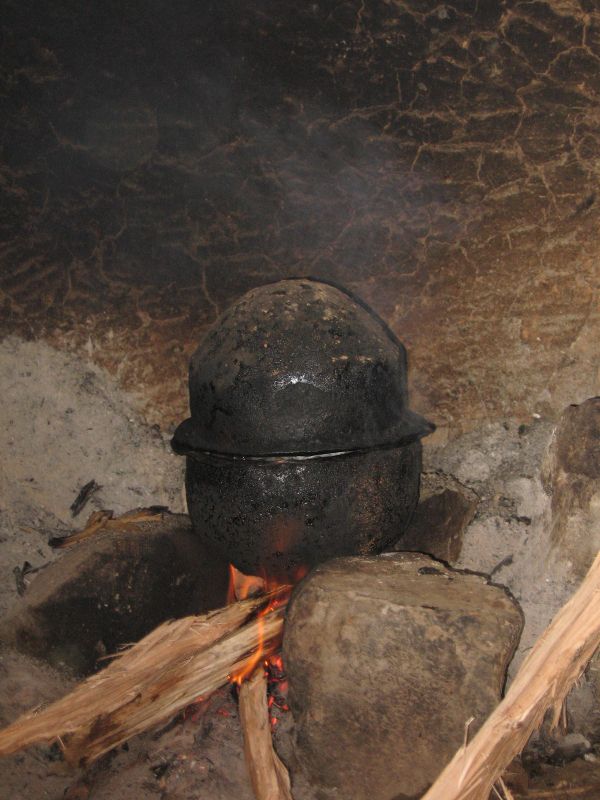
Above: This is the roof of Pascal's grandfather's kitchen – I mentioned about the government policy of removing traditional roofs ...
Left: Rice is prepared for our lunch. [Again, all pictures were taken by Britta.]
For someone from Europe, or 'the North', it is not always easy to relate to houseboys or maids, we are not used to having people working for us. So things work differently in my house from the usual way, and I do things differently: for instance, visiting someone else at their house, I shake the hand of the person who lets me into the compound. And of course P and B are not houseboys. When Britta first arrived, she did not quite understand this, so when I suggested that Joseph, she and I go for a drink nearby, she pointedly invited P and B to join us. I needed to explain to her that the reason that I had not asked them to come along was that the conversation between the five of us would not have worked well, and that we were going for a drink with them the next day. (I don't know what neo-colonialist attitude she was still suspecting me of at that time ...)
But I have had time to meet a few new people. [Who says I am moaning?] Like a guy, Modeste, also a recent school leaver, who works at 'our' local bar. Since Britta and I talked to him a few times while having a drink there he has dropped in on occasion, when he has been given permission to leave. He shares a room behind the bar with another employee, works from morning till night, but gets his food, and is paid RFr 20,000 (= $ 34) per month. – And Oliver, a friend of Benjamin's from his school, who came this weekend, with whom I went to a hospital in town today, to visit his elder sister, (married, two kids) who had had to have a leg amputated after a motorbike accident six weeks ago. This was the first time I was in a hospital in Rwanda – the first time in Africa, in fact. The ward looked clean if a bit crowded, the beds heavy metal contraptions, the patients well looked after. Apparently though the hospital only provides very basic food, rice and beans, and patients largely depend on their relatives and friends to eat properly, so we took fruit and juice. While the feel of the hospital itself was no worse than it would have been in Europe, what disturbed me was the thought that O's sister, or some of the other people I saw on the ward, might not have had to have an amputation if the medical facilities/expertise were more advanced.
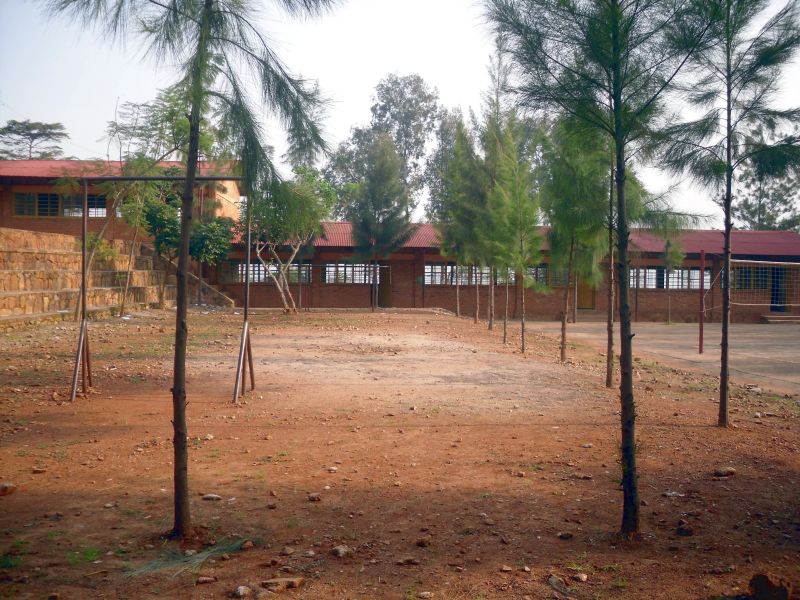
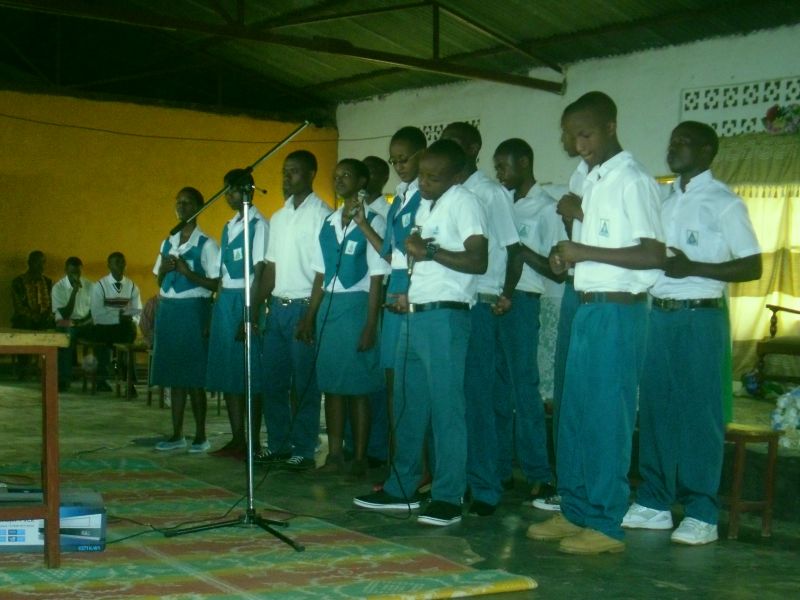
Above: at P's school.
Right: a 'performance'
of the English Club.
02 April 2011:Am on the plane from Kigali now, (with some wine: I will drink no more beer for the next two weeks!) flying to Brussels, from there I will take the Eurostar, (my first time!) to London and then go to Llantwit the next day. Then on to Switzerland for two days, and from there, by train, to Berlin, where I will have 9 (hopefully:) relaxed days at home. A much needed break – the last few weeks were too busy at school. I was still teaching this morning, the 'SAT Strategies' course. Most of the rest of life has been good, but not all, there were sad events.
A week ago, L, who was visiting after his exams were over, (in which he came 6th in his class of 40; his brother came 1st in his class at his new school) and P came to where I was reading, to tell me that they were "not happy": one of B's older brothers had just been killed – "passed away" – in a motobike accident. The bike, as it turned out later, had been driven by his best friend, and the accident was probably their fault. So until midnight we were in the emergency room at CHK, (Central Hospital of Kigali) my second time there in a few weeks, where other members of B's family were assembling, all of whom I had met before in the village, including his cousin whose wedding I had attended last year. The closest death has come to me, I think, other than in the family, and when it was expected. A striking scene in the emergeny room, even for the locals, of two just bereaved women in traditional dress wailing, pounding the ground. The next morning I saw family and friends off at the morgue, when they had bought a coffin and collected the body for burial, which took place less than 24 hours after the accident: some 15 people standing around the coffin, on the back of a small lorry, under plastic sheeting because of the rain, for what must have been a very rough ride to the village. P came back late that evening, as they had had to wait for the priest for hours, and B two days later. Sorry.
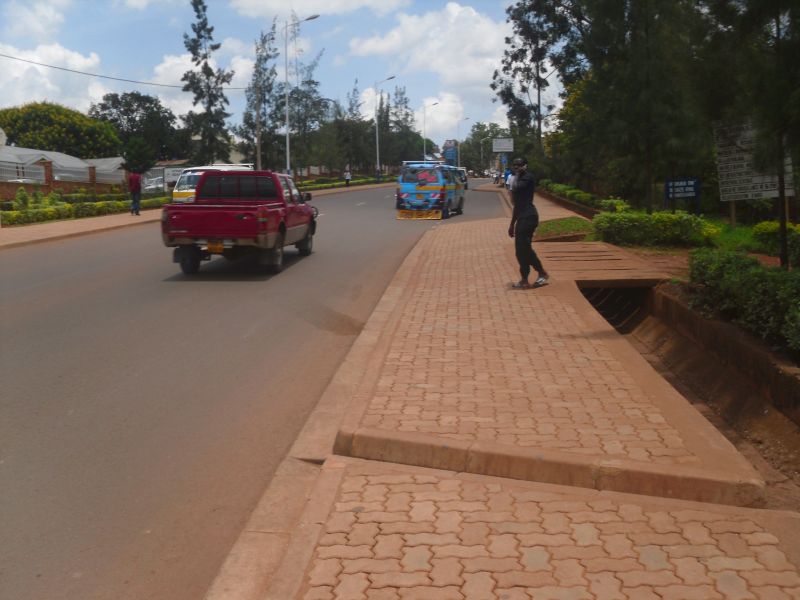 The other sad thing, smaller in a way but also larger: Modeste from the bar was away for a few days because of trouble at home. I have mentioned the Gacaca courts before, an old tradition used recently to help deal with the consequences of the genocide. Apparently his father had been before the courts some years ago, and been found not guilty. But recently a neighbour had lost a case, relating to property that had been taken from the home of a genocide victim in the village, and had been told to pay RFr 2,000,000. This they had no means of paying on their own, without selling all their land, so they implicated other people who they said had been there, so as to divide the sum they had been made to pay, and one of these was M's father, who suddenly found himself liable for RFr 120,000 (= $ 200) and part of his land confiscated because he could not raise that kind of sum. Sorry. Sadly, (for various reasons) the bar where he was working sent M away a few days later, unrelatedly and not for anything he had done wrong. After checking with P and B that the story was coherent and plausible, we had M stay until he left the next day, and I did help out.
The other sad thing, smaller in a way but also larger: Modeste from the bar was away for a few days because of trouble at home. I have mentioned the Gacaca courts before, an old tradition used recently to help deal with the consequences of the genocide. Apparently his father had been before the courts some years ago, and been found not guilty. But recently a neighbour had lost a case, relating to property that had been taken from the home of a genocide victim in the village, and had been told to pay RFr 2,000,000. This they had no means of paying on their own, without selling all their land, so they implicated other people who they said had been there, so as to divide the sum they had been made to pay, and one of these was M's father, who suddenly found himself liable for RFr 120,000 (= $ 200) and part of his land confiscated because he could not raise that kind of sum. Sorry. Sadly, (for various reasons) the bar where he was working sent M away a few days later, unrelatedly and not for anything he had done wrong. After checking with P and B that the story was coherent and plausible, we had M stay until he left the next day, and I did help out. 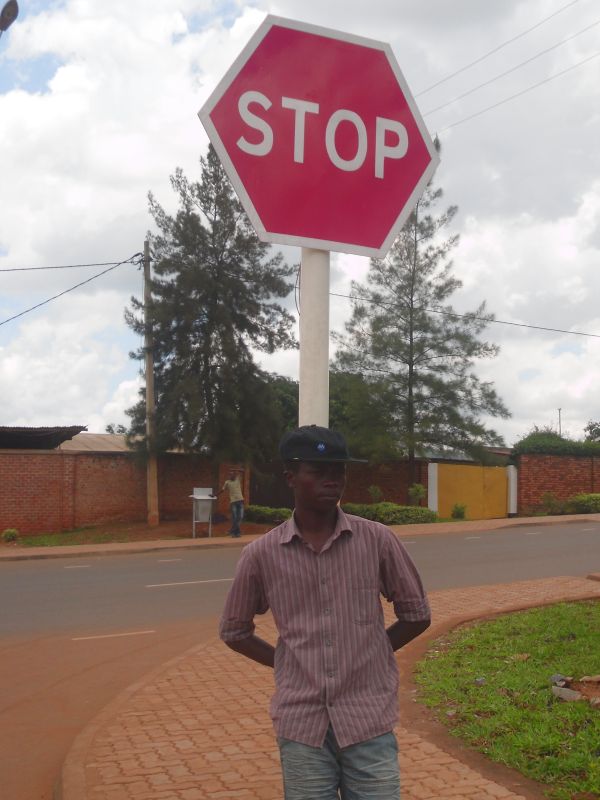 Apparently the Gacaca courts have only been about 70% good and 30% bad – not a good enough record, I feel. I wonder if the Truth and Reconciliation Commission did better in South Africa. M seems to be a good guy, "humble", to use P's word, and we have invited him to come to visit for a weekend in April or May.
Apparently the Gacaca courts have only been about 70% good and 30% bad – not a good enough record, I feel. I wonder if the Truth and Reconciliation Commission did better in South Africa. M seems to be a good guy, "humble", to use P's word, and we have invited him to come to visit for a weekend in April or May.
On a lighter note, Rwandans seem to go for shortened forms for companies, including often the name of the country, so they have ended up with some odd-sounding ones, like Caferwa, Sonarwa and Bralirwa.
Do you notice anything odd about that sign? Most of the ones in our area look like that, but not so many in other parts of Kigali.
(The guy is Oliver, I mentioned him before, from near P's and B's village and from B's old school. He was around when I was leaving, and went for a walk with P on the last day.)
From Rwanda, Term 6
(As all letters, this is of course partly written for myself ...)
02 May 2011:It's been a month precisely, half of which I spent in Europe: after short stays in the UK and Switzerland, and a weekend visit from Eric-Jan, I had five days on my own, which was nice: to read, cycle around, go to concerts, eat cakes and German Abendbrot, and so on. I discovered one disadvantage of living in Berlin though: it is the German capital, which means that there often are parts of the city which are closed off, because of a visit from the Dutch Queen, for instance, or a meeting of NATO foreign ministers. – Because of moving to the Northern hemisphere academic year, we will in future only have a break of only one week in April, so I will only be travelling twice a year, for a few weeks in the winter and a long time in the summer, from mid-May to early August.
The start of the term has been very hectic at school; in fact, it is beginning to seem like the state of having too much to do is becoming permanent! :-( Time at home though has been busy but great fun: during the first week, when we were probably the only school in Rwanda that had started its term, various friends came to visit, and also, in some cases, to get (in one case: part of) their school fees. On the one hand, it is not so uncommon here that someone is supported by a richer family member, so the financial interaction is natural and does not take away from the fun of these visits; (I think I mentioned some time before that Pascal used some of his meagre earnings, when I first met him, to help Laurien.) On the other hand, it has also been pointed out, by quite a few people, that the local rich people are not willing to help anybody else.
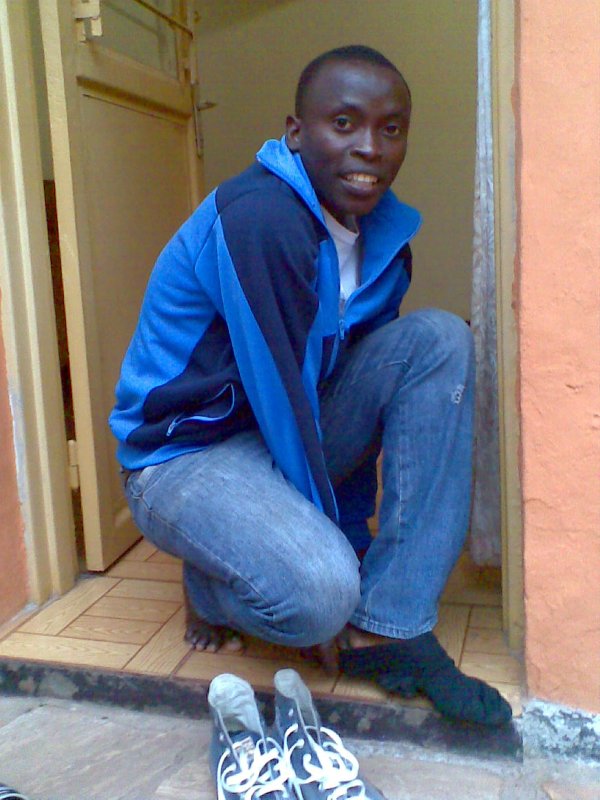
And this last weekend, Modeste came to visit us, the guy who used to work at our local bar and with whom Britta got along well when she was here. I like him a lot too. When we all went for a drink on Friday, I found that our local bar has become less attractive in other ways too: there are now strings of flashing lights on the wall above the outside seating area. Perhaps they feel they need to compete with more fancy places that are springing up around here, two of them owned by a muzungu (= white person).
Here is something like an appeal:As I have mentioned, I have been able, with the generous support of in particular two friends of mine who have covered the school fees, to enable some young people here to go to school who otherwise would not have been able to continue their education. There were four last year, but Benjamin took his final exams in November, and this year there are 3 1/2 – for one person, as I explained above somewhere, we are paying half the fees, as his mother can afford the other half, just. All of them are doing well: in fact Jean de Dieu, even though he does not talk much when he comes to visit, at least not in English and with me, came top in his class at the school where he just started.
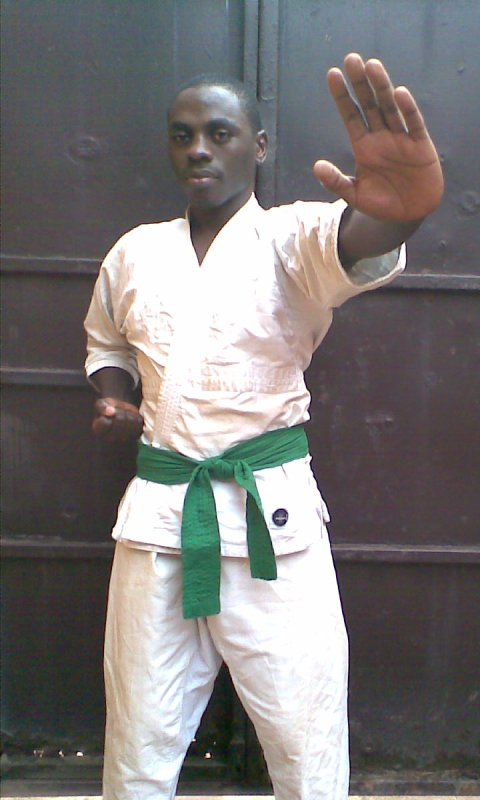 [I updated this paragraph two weeks later, after the government had published the requirements for gaining a loan to cover the tuition fees at a university, which still leaves the board and lodging, of about RFr 350,000 (= $ 600) to be covered.] So B and M both finished school last year, and did very well. Next year, i.e. from January, both want to go to university, and both have asked me, separately, if I could pay for them, or if I know someone who could. M's main subjects were Chemistry and Biology; he did well enough to be offered a government loan to study at KIE, the Kigali Institute of Education, which is the best teacher training institution in the country – but he is a lot keener to study nursing or medicine, and he has mentioned a 4-year nursing course in Burundi, to the South of Rwanda, costing RFr 700,000 (= $ 1200, including board and lodging) a year. B's option was electrics, and so he wants to study engineering. He got the second-highest result in his class of about 30, but still missed out on a loan. A course for him in this country could be around RFr 1,500,000 (= $ 2500) per year. But he is really keen to study abroad, like in India or Malaysia, where the total cost, at decent places, would be about $ 5000 per year. (He knows that is a long shot!)
[I updated this paragraph two weeks later, after the government had published the requirements for gaining a loan to cover the tuition fees at a university, which still leaves the board and lodging, of about RFr 350,000 (= $ 600) to be covered.] So B and M both finished school last year, and did very well. Next year, i.e. from January, both want to go to university, and both have asked me, separately, if I could pay for them, or if I know someone who could. M's main subjects were Chemistry and Biology; he did well enough to be offered a government loan to study at KIE, the Kigali Institute of Education, which is the best teacher training institution in the country – but he is a lot keener to study nursing or medicine, and he has mentioned a 4-year nursing course in Burundi, to the South of Rwanda, costing RFr 700,000 (= $ 1200, including board and lodging) a year. B's option was electrics, and so he wants to study engineering. He got the second-highest result in his class of about 30, but still missed out on a loan. A course for him in this country could be around RFr 1,500,000 (= $ 2500) per year. But he is really keen to study abroad, like in India or Malaysia, where the total cost, at decent places, would be about $ 5000 per year. (He knows that is a long shot!)
Now, my financial situation, at present and I think for the foreseeable future, is such that I can pay on my own, but because (as I have explained to them) I want to act in such a way that I can give the same opportunity to some other people, notably P and L, when they finish school, I don't want too expensive an option. So if one of my friends who is a reader of this non-blog was willing to participate in my little scheme, or knows somebody who would be, then that would be a nice thing to do together and would take some pressure off me – and it would be a good thing to do. While I would be able to find academically stronger candidates, by holding interviews, these are people I know and trust, from a very poor background, who I am sure will make the best of any opportunity they are given.
(This may be the right place to write the following, just in case: I would be grateful (now of course, not then), should something happen to me some time, if my friends could arrange to use the money that will have been mine (but won't be anymore, of course) to allow the people mentioned here to complete their studies.)
The school holiday in April was for Genocide Memorial Week, but those 100 days in 1994 are remembered officially for 100 days: even after I came back, for some time, at least one item in every TV news programme seemed to be about some commemorative event, and many billboards carry posters in commemoration, more so than last year. As I mentioned before, any mention of the tribes, Hutu and Tutsi, is frowned upon, and can lead to accusations of 'genocide ideology' – except, that is, as part of one phrase that one hears all the time: "the 1994 genocide against the Tutsi". (Not unrelatedly, it has sometimes seemed to me that the holocaust, as well as – or perhaps even instead of – being an atrocity committed against the Jews, has become mostly a stick for Israel to beat the world with.)
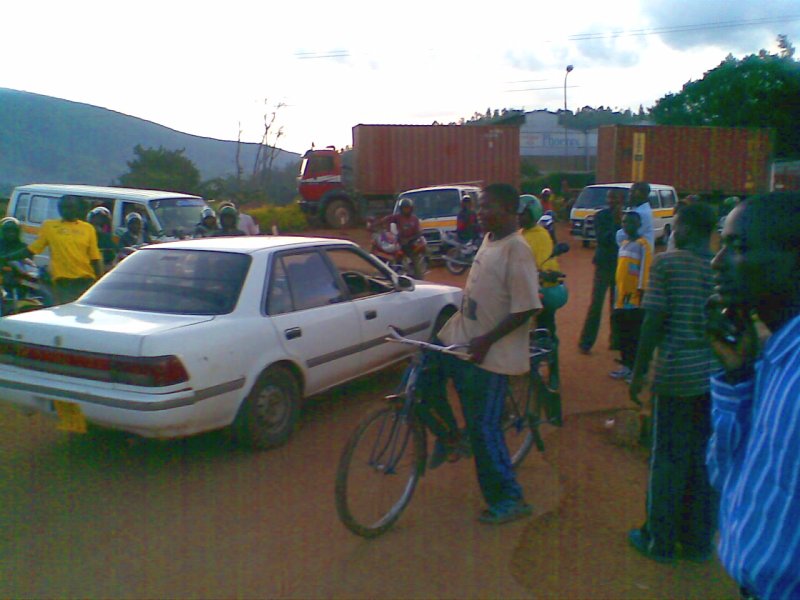 08 May 2011:This weekend we went to P's and B's village again, I stayed at L's house this time; he was happy, because he is always there on his own. On Sunday it rained a few times, heavily, so we spent a long time on the bed talking, and practising a bit from some of his notebooks: he has his O-level exams in November and his whole class is already revising. Fortunately the last downpour stopped in time for the ceremony that was held seven weeks after the death in a motorbike accident of B's brother, which was the reason that we went to the village this weekend.
08 May 2011:This weekend we went to P's and B's village again, I stayed at L's house this time; he was happy, because he is always there on his own. On Sunday it rained a few times, heavily, so we spent a long time on the bed talking, and practising a bit from some of his notebooks: he has his O-level exams in November and his whole class is already revising. Fortunately the last downpour stopped in time for the ceremony that was held seven weeks after the death in a motorbike accident of B's brother, which was the reason that we went to the village this weekend.
The village is in the hills, not so far from Kigali, 25 minutes from here by motorbike on a dirt road.
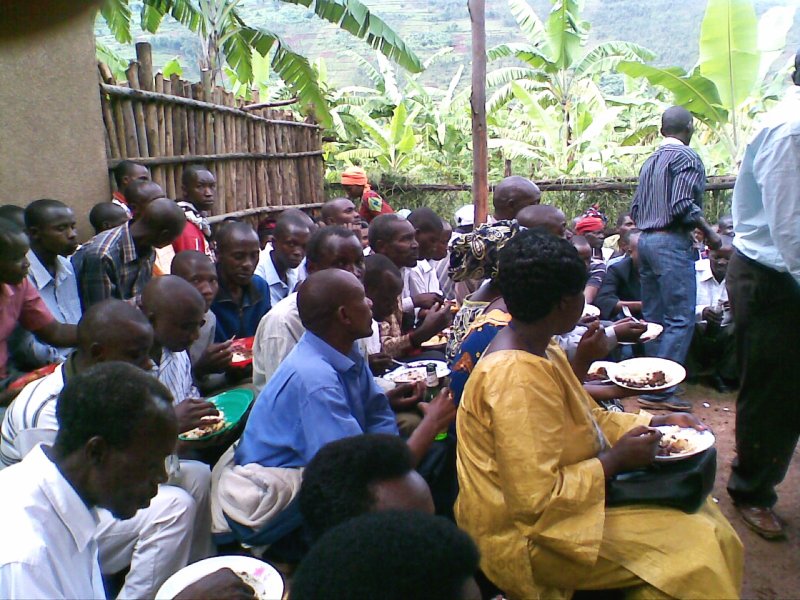
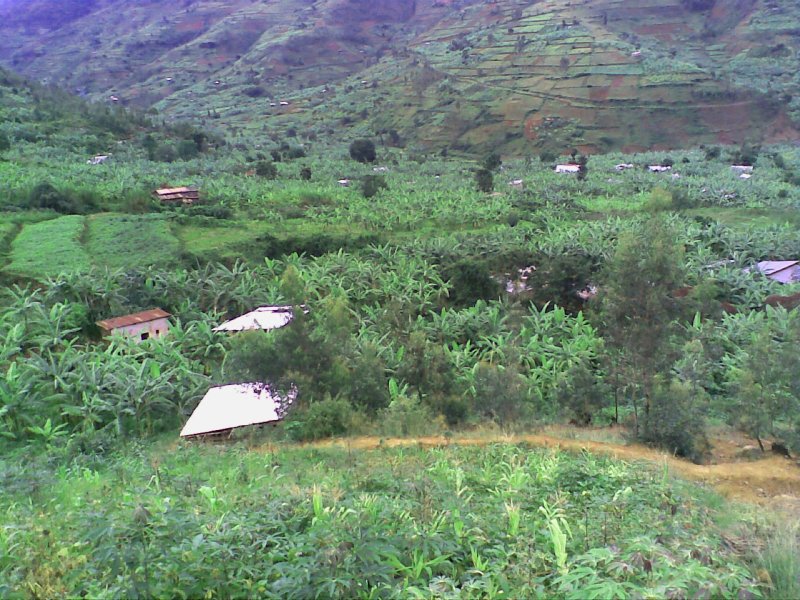
Walking down the steep path from L's house.
This is common here, it seems, a formal occasion where an inheritance can be divided, anyone who had any claims against or quarrel with the deceased person is invited to speak up, some money is raised for the family, and so on. There are speeches and some singing, but there is also banana beer, beer, Fanta, and food for everyone.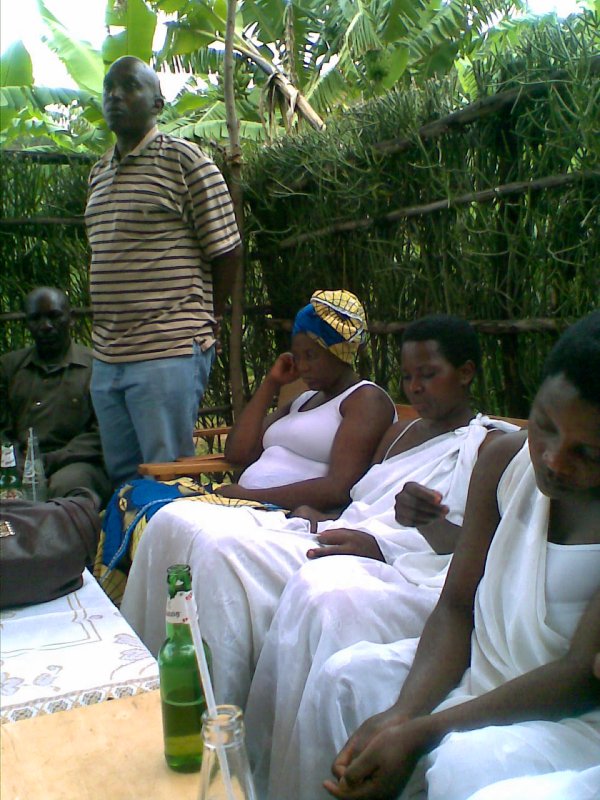 I was placed in the front, as usual, this time with L next to me to 'look after the honoured guest'. And for women and children there is some traditional medicine, (provided by P's grandfather, who walked away, in exchange, with a calabash of banana beer) to ward off any evil influences. As one of the speakers said, apparently, "this is not the end of mourning, but we dry our tears for a moment for this event." A sad occasion, but still a good weekend.
I was placed in the front, as usual, this time with L next to me to 'look after the honoured guest'. And for women and children there is some traditional medicine, (provided by P's grandfather, who walked away, in exchange, with a calabash of banana beer) to ward off any evil influences. As one of the speakers said, apparently, "this is not the end of mourning, but we dry our tears for a moment for this event." A sad occasion, but still a good weekend.
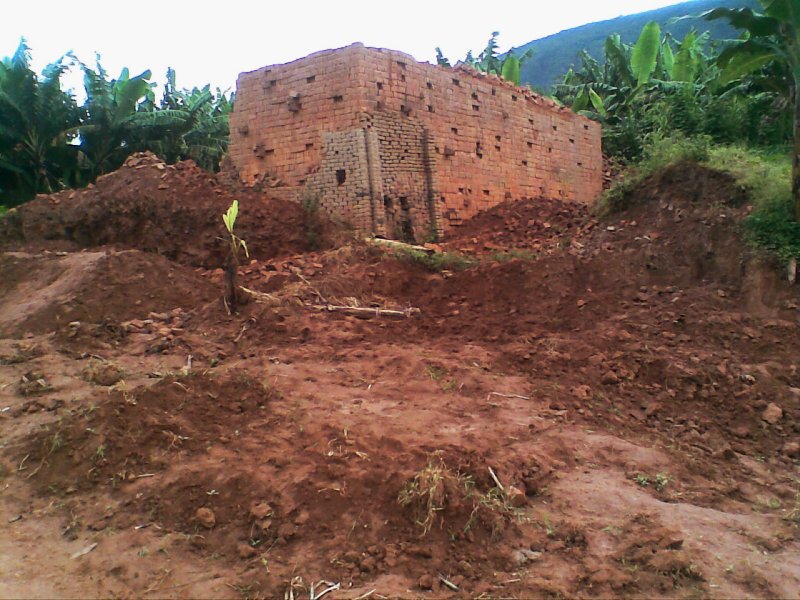
The traditional way of making bricks: after shaping them out of the red mud/clay that is so common in East Africa, and allowing them to dry in the sun, they are stacked into piles like in the picture, a few meters high, with holes in them, in which wood fires are then lit to fire the whole pile of bricks.
A cell is part of a district and is divided into zones. P had to get various papers from the offices of our zone and our cell before he could apply for a passport, which is what he is in the process of doing: I am hoping to be able to bring him with me to Europe for a few weeks in November. The main problem could be the visa, but as I am having to get a new passport myself, I have started to talk with the consular lady at the German Embassy.
Something I have known for many years, from having African friends at AC, is how people here are careful with information, even with their friends. This evening, after we came back from the village, P's closest friend at school came around and they studied together for a test for a few hours. But P had asked me not to mention to him that we had been away and where we had been: "Why does he need to know? I don't ask him what he has done this weekend." But they are certainly very close. – I have come to appreciate this trait over the years.
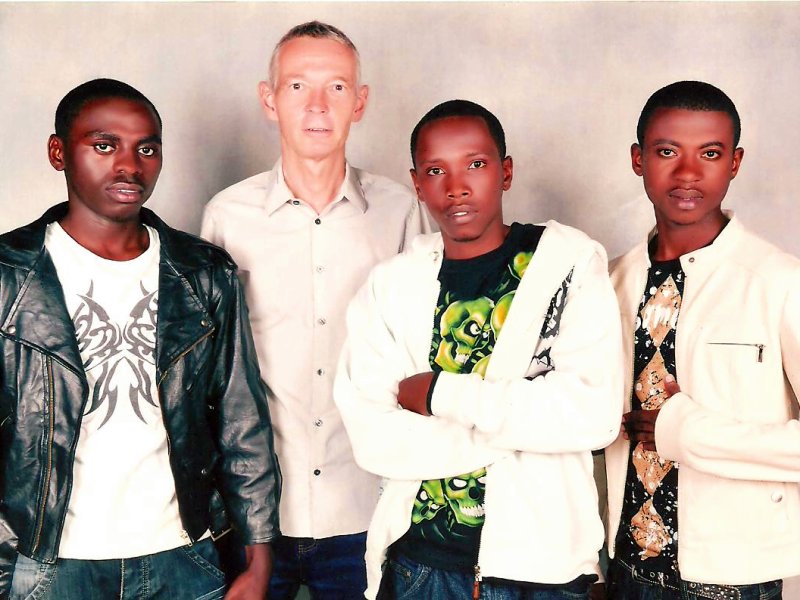
Again, not my style of picture, but the formal kind, taken in a studio, that is popular here to commemorate a special occasion – in this case the (almost-)double-birthday of P and R.
This evening Jose, after teaching tango again to a group of students, is staying at the school to watch a play about the genocide, which is such that none of the students will be admitted – so I thought it would be safer for me not to attend either. He will then be picked up by the Headmaster's houseboy and the two of them are going to go out, and he is going to stay at the Headmaster's house. (That guy needs someone with a driver's licence next to him when he uses the car, and so he couldn't drop Jose off later tonight.) Tomorrow morning Jose is supposed to have a meeting with an extremely wealthy Rwandan who wants to set up a more serious music school than the other one, and wants some advice and make some connections. And then Jose and P and B will take an overnight trip, while L will stay here: Jose had suggested he come this weekend, when he met him on his day-trip to the village last Saturday, but now it looks like he may not even meet him. So I am planning to take L to the pool, for his first swimming lesson. – In fact there are so many things for Jose to do and so many people to meet, that it can't be easy to keep track of all the plans ...
18 June 2011:This non-blog has been a bit slow recently, (or non-fast?) as one of my friends, and a regular reader, pointed out in the Subject:-line of an e-mail. Sorry. With Jose still being here, even though to a large extent he has developed a life of his own, mostly with a different 'set' of people from the ones I tend to be with, and me having more and more to do at school, ... The IB Induction period I mentioned has gone fairly well, but required a lot of planning and effort: it looks like we'll have 90 students starting the IB next year, and the necessary organisational structures for such a number are only slowly being put in place – but hey, that is partly what I am getting paid for. The construction of a new 12-classroom IB Suite is being started soon and should be completed by January, so if I stay to the end of the contract I have just signed, in July 2013, I should even have my own office for the last 1 1/2 years here ...
I am hoping to put some pictures for the last few weeks soon.
Some domestic changes: Tadeo has taken a job somewhere else in Kigali, which includes a room at his place of work, so two weeks ago he (+ his brother, who had been staying since October, + a friend of his) moved out of the other house in the compound. I offered J 'the right of first refusal', but he is looking for something with the guy with whom he is sharing a house now, and he found it too pricey – he earns well enough, but like everyone who has a job, he has a lot of 'dependents'. So we (i.e. P and B) will contact a 'commissioner' to find us a new tenant: RFr 70,000 (= $ 120) per month, including electricity and water, but excluding use of the kitchen in the compound. The owner of the compound, a nice Rwandan lady living in Maine, is here for a visit, and so the outside walls are being repainted, some minor problems are getting fixed, and so on. Not much, she said, that can be done about the mice in the roof, and sometimes inside the house or the kitchen, "they have always been there." – What's still to come this term: after Jose has left on Tuesday, we'll have visits again from a few of our friends – M will want to decide (or: will want us to decide) whether to study nursing or accept the place he has been offered at KIE; with O I will be doing at least five hours of trigonometry when he stays next weekend; and L will come from the village to say Good bye! the day before I fly. More officially, we'll have a brief visit to the school on Wednesday from the former German president, Köhler, a good man from what I know about him.
Talking of Germany, I'll be flying to Berlin in two weeks, and am by now greatly looking forward to the five-week break. I will take one one-week trip during that time: a day in London, a day in the area of AC, for which I am renting a car, three days in Edinburgh to visit Bernd, and three days in Bari, the furthest South I have ever been in Italy, where Sebastiano will be rehearsing for a music festival. The rest of the time I will do the usual in Berlin – i.e. mostly nothing, including cakes, concerts and books. But I am open to being visited.
The next evening:Went with P to visit R at his boarding school today, not as far from Kigali as I had thought. Had to have a chat with the Headteacher, of course, and took R and P and two friends of R's out for lunch in a restaurant/bar near the school. Nothing fancy, but boarding school food must be pretty desperate, since the cost of tuition and boarding is only RFr 100,000 (= $ 170) per term. In fact, on the way back, P thought that if one gave any boarding school student a genuine choice, between their best friend coming to visit and RFr 1000 in cash, they would take the cash! – A very nice day out, except that I had woken up with some digestive problems and pain, the first time I have suffered from something like that here, but I improved in the course of the day. My main worry was where I would find a toilet if I needed one suddenly, but as always P did all that was needed. So, still a very nice day out.
We haven't seen Jose for the past few days, not since he went to have a meal with some students from my school, the day after his birthday, and to go out with them. We had been supposed to go swimming together yesterday, and Daniel came in the evening to spend time with him and me, but even though we have kept in touch by SMS, I don't even know where he slept last night. At the beginning I had been worried that he might not want to do anything independently, but having found the right 'set', for him, he seems to have been enjoying himself. (I think I have mentioned before that my world here is divided, between the rich people where I teach, with some of whom he seems to be getting along very well, and the 'normal' Rwandans where I live. In fact, he seems to be quite 'a hit' with the former group.) He will be leaving on Tuesday, back to the US and a conductors' course at Bard.
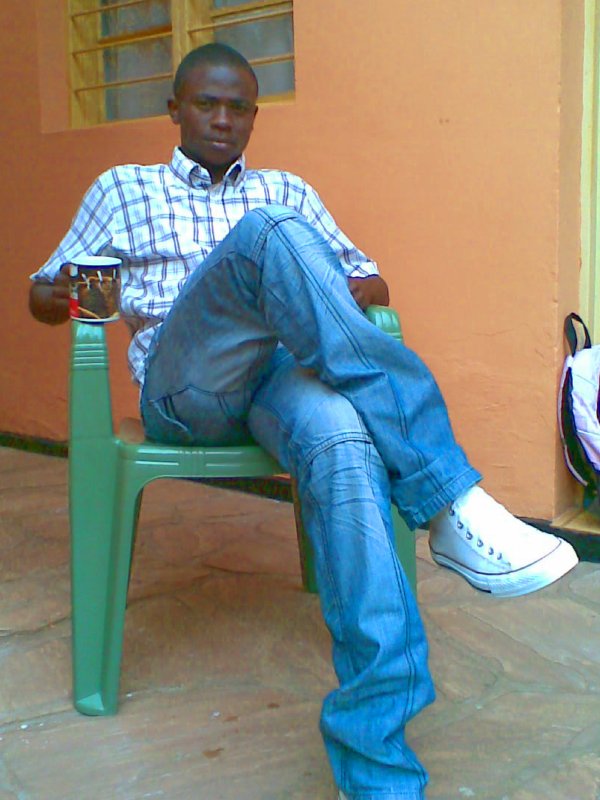
O on one of our new chairs for the compound, just after another couple of hours about matrices, and a meal and a bath, just before heading back to his boarding school, a two-hour trip: it is where B used to study as well. There they have apparentlyly run out of money, so the students have been given kaunga (a pap made from ground mais) twice a day, seven days a week, instead of having rice once a day as they used to, and would much prefer!
06 July 2011:I am in Berlin by now, and will have to write some things on this page again, and also find some other pictures. This is because my netbook died on me the last day I was in Kigali, after three years of heavy use and much moving around with it. "Perfect timing," I could say – literally, in that the term's work was over, and I have now had time to switch to the dead netbook's clone/twin, but also sarcastically, since I was just sitting down to make a back-up before travelling! Fortunately I don't seem to have lost much else.
In Berlin, after two days here, I am just past the stage of wandering around my apartment, and my area, aimlessly, trying to find things to do: it always takes me a few days, when coming this way, to adapt. The weather has not been great so far, but tomorrow I'll try to go to the first two concerts of these holidays, in the afternoon and in the evening.
The day I left was a holiday weekend, the end of the annual 100 days of mourning that start with Genocide Memorial Week in April – hence the flags on the main roundabout in town. B and L (who had come for the weekend) pushed me to the bus, but P came – unnecessarily by now, but nicely ... – to the airport with me.
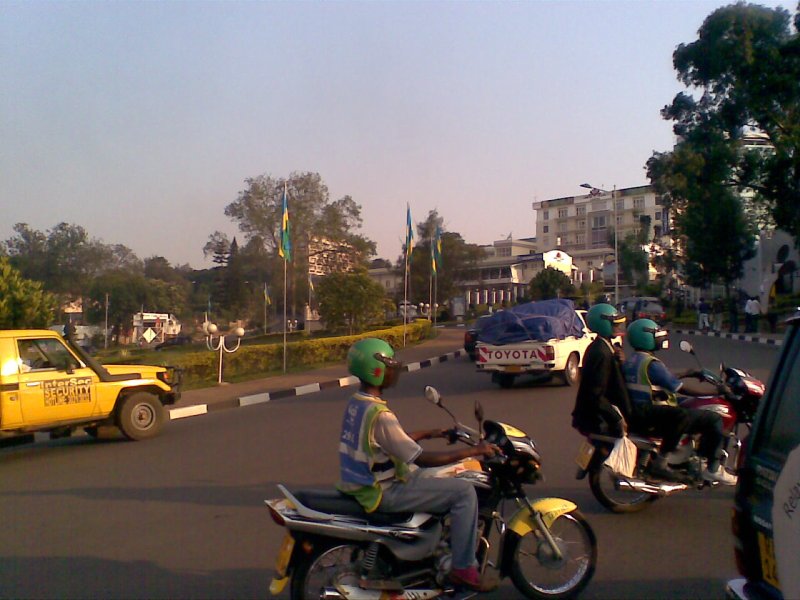
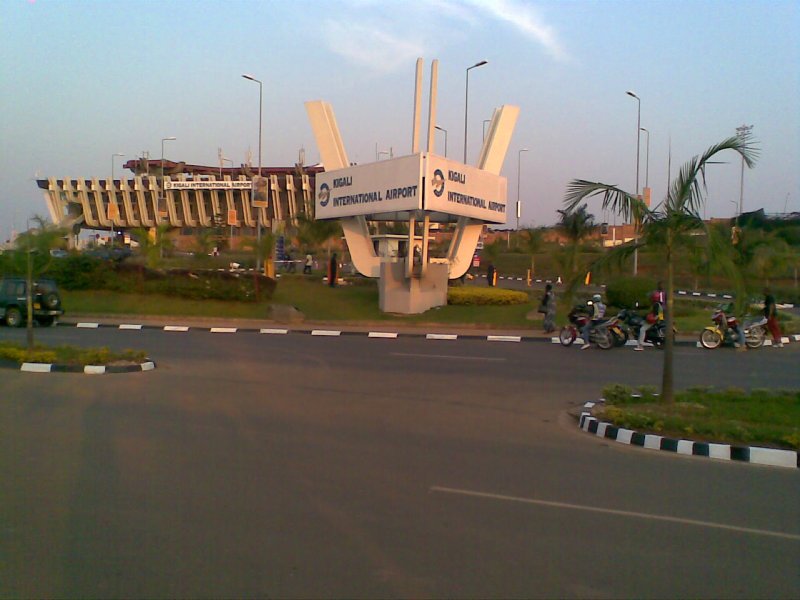
These holidays I will be mostly in Berlin, with an eight-day trip away, to London, S. Wales, Edinburgh and Bari, which is further South in Italy than I have ever been. I am looking forward to this time to take it easy. – Bye for now.
P.S.During the visit of the German exchange group, I was asked to accompany them on their trip to the German Embassy and the Kanombe Museum, near the airport, which is in fact the former residence of President Habyarimana. (The year before I had gone with them to the Embassy and a coffee 'factory'.) It was the shooting down of Habyarimana's plane, just when he was returning from a meeting that might have settled the tribal conflict in Rwanda, that triggered the genocide in 1994. It is still not clear who was responsible for that attack, but it may well have been extreme Hutus in the army that did not want a settlement.
The building has various oddities, such as a secret third floor, with a small chapel, but also a room for visits from the President's witch doctor (– unless that is just propaganda ...) But the oddest thing is that when the plane was shot down, the wreckage came down just outside the Presidential compound, within sight of his house, and some of the bodies actually fell into the compound, "near where his children were playing in the pool," as we were told. While the compound is indeed in the flight path of the Kigali airport, so that during our visits a few planes flew straight overhead, and it is located at the top of a hill, from the slopes of which one would have had the best shot at the plane, it is still struck me as a rather macabre coincidence.
From Rwanda, Term 7
(After two years, this life is beginning to feel like my normal life ...)
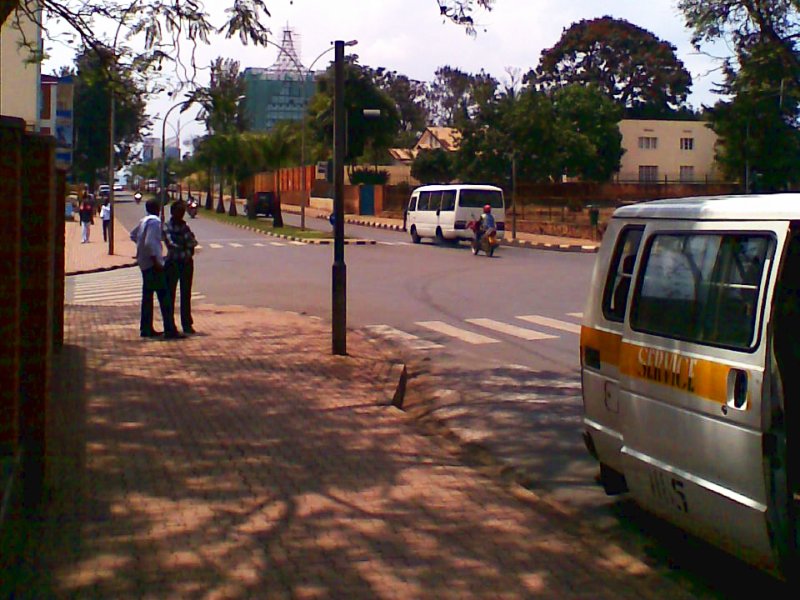
When I came back, I found that the stops of the 'taxis' had been moved out of the city centre, to places some 5 or 10 minutes' walk away. While this doesn't affect people who just need to change taxi, it is a hassle if one has business in town; moreover, in one place, when it rains, there is no cover along the road.
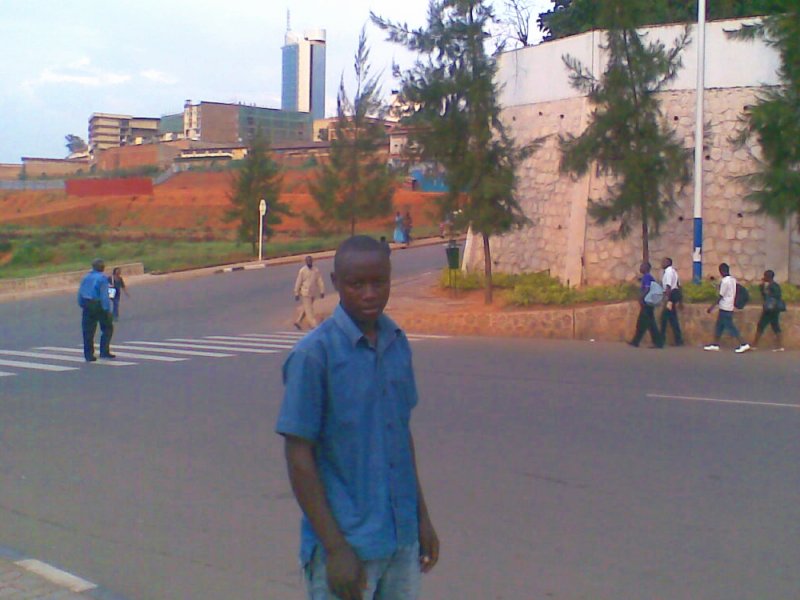
Of course the centre, around the recently completed tallest building, is less hectic now. I have asked people if there had been any prior public debate, but apparently not – I am afraid it feels like a decision by people who all have cars, or own shares in that building. :-( But I have only picked up a few mutterings.
(While I have heard that a new taxi interchange will be built, closer to the centre, the move could have been delayed till that place is ready, no?)
[These pictures were taken the first weekend of September: I went to town to go swimming, but the pool has been repainted and will only be refilled next week; in the afternoon I 'pushed' Laurien, who came to visit this weekend.]
21 Aug 2011:Came back to Kigali after five weeks in Europe, mostly in Berlin and on my own, but with a trip to the UK and Italy. Berlin was much wetter and cooler than it should have been, but it was a great break. Pascal picked me up at the airport, again not necessary but nice – for my own things I had hand luggage only, but I came with a suitcase containing a wedding dress and some things for a baby, (not for the same relative): the owner of the 'hair saloon' that is next to our compound has a cousin in Berlin, and I have been carrying smaller items from here to there before. I was thanked too much, I feel: the Rwandan lady had even brought the case to the airport when I was leaving, so no hassle at all.
As usual during the first two weeks, many of our friends have been coming to visit for a couple of days, to 'greet me' and in some cases to pick up (part of) their school fees for this term. (B's sister, now in Senior 3, is a new recipient – the first girl.) Oliver is here this weekend: not someone I/we are paying for, but I will be explaining about integration to him for a few hours while he is here, as his final exams are coming up in November. Something nice to know: the notes he takes away become a resource for other students at his school, so a kind of multiplier effect.
I had also invited a guy whom I had met the last evening of my first term here, when I was living in the other place, who had completed secondary school (but was already 22 years old) and was preparing to become a primary school teacher, which he now is, in his village near the border with Congo, about as far from Kigali as one can get, six hours away by bus. I had offered to pay the RFr 10,200 (= $ 17) for his return ticket, and he mostly visited other friends here: this was his first trip to Kigali in the 1 1/2 years since we met – apparently his take-home salary is RFr 24,300 (= $ 40.50) per month. He has been finding it too difficult – incidentally, "too" in the local English often means "very" – to keep paying the school fees for his brother, who is in Senior 5 and has 1 1/2 years until he finishes, like P. So I/we agreed to pay half the fees for this term; I suppose it will be necessary to do the same next year.
Our start-of-year retreat was only one day this time – it had, after all, only been seven months since the last start of a year. We had it at a conference centre very close to the hill-top holiday facility which Habyarimana had set up for his army officers, before his plane was shot down and the genocide. The top of that hill was in fact the last location controlled by the Hutu army in 1994, and from there they were able to shell the city, including the Parliament building, so there is a cemetery for the RPF fighters who died there (– as I have written before, the genocide is still never far away.) So I had two free days after arriving, which was nice. Since then, things at school have been very hectic: with the number of IB students increasing, the task of organising subject-choices, classes and so on is getting bigger. To make matters worse, – though only slightly: the promotion is mostly (I hope) a switch from de facto to de jure – as of this term I am not only the IB Coordinator but one of the two Vice-Principals of the Secondary School with its well over 500 students from grade 7 to grade 12. (I had no choice really, so congratulations are not welcome! I mean it.)
Benjamin and I have decided that he could/should go to study Electronics & Communication in India, starting with a three-month English course in March. He would have liked to do Engineering, and if he was staying in this country that is what he would have done, but even after having passed very well in his course in Electrics at secondary school, he would apparently not be sufficiently well prepared to study Engineering outside: not enough theory. (Similarly, Joseph has been struggling to do well enough in the ACCA courses, paid for by the government, leading to an international accreditation in accountancy, despite the fact that he had been one of the best at his university. It does not help, of course, that he also has a full-time job at the National Audit Office.) Apart from its relative affordability, ($ 900 per year tuition plus $ 1200 for living expenses, for three years, plus the flights there and back) an advantage of the place where he is planning to go is that there is someone in Kigali, a local businessman, who is their representative, so organising things will be easy, and there are apparently a number of Rwandans there already.
Modeste has been looking for a course in nursing. Unfortunately Hope University in Burundi is not as good as it had appeared, from some reports and on the website: there are for instance no courses in English, it is all in French. And when he was about to go to the university in his province again, a place that had become available in nursing had just been given to someone else. So after thinking about it for a few days, he accepted my suggestion, to take up his place at KIE in two months, where he has a scholarship and only needs his cost of living paid, and then to apply again at the university in his province next year. I think it would be bad for him to be just in the village for two years between school and university: this way his English will improve and he will learn academic skills, even if they are not directly related to nursing.
I very much appreciated a mail from someone reading this non-blog, which I did not know she was doing, saying that she and her husband would be willing to pay M's costs. Thank you very much. And I do have an open offer from another friend to also start to contribute to what seems to have become an informal scheme.
Good news: I had invited Pascal to come to Europe with me for three weeks this November, and he had got his passport last term. As soon as I had come back we could start the process of applying for a visa, because that can only be done at most three months before the date of travel, and two days ago he was called to pick it up at the Embassy. I think we'll be in Berlin most of the time, but I would like to take him on a trip to some other countries and meet some other friends of mine. Often while moving around in Berlin, I have been wondering how some of the things there would strike someone from here; so now I'll find out. (A bit of that I had already seen with students at AC of course.)
It's been cooler and wetter than it should have been during the dry season, so I have not been swimming yet, but I read a warning from the Rwandan met office that farmers should not assume the rainy season has come early and start planting: apparently we will have another four or five weeks of hot and dry weather – which is fine with me.
17 Sep 2011:Have continued to be very busy at school – fortunately I "don't do stress." But all very varied: I even got to teach some Economics classes after the HL teacher just 'upped and went'. We have in the meantime hired a new guy, also from Kenya, but he is a bit 'green' as far as the IB is concerned, so I am very pleased, both officially and personally, that Andrew Maclehose, who at one time taught me Economics when I was at AC (!) and who probably has the most impressively varied CV that one can imagine for an IB teacher, has agreed to come to Kigali for a month, mostly to help the students whose exams are in November, but also teach other classes and work with the other Economics teachers. I think it will be fun, for him and for us.
In case any of my friends/readers has missed updates on the Kigali road system, ;-) I can report that various sets of traffic lights have been newly installed, or reinstalled, apparently from China, although the timing of the phases is not quite right yet; that new traffic signs have appeared in many many places, including a helpful one that says "Bridge"; that we have all received text messages on our phones, in English and in Kinyarwanda, warning us that using the phone while driving is an offence; that little lights, yellow on the right, red on the left and other colours in other places, are now helping drivers on the main roads to steer clear of the kerb; and that new buses, very similar to the ones one sees in European cities, but apparently also from China, have just been introduced by one of the local transport companies. However, a major problem that remains is lack of lane discipline, even among the school bus drivers.
Arnold showed himself quite impressed with the Kigali. He came here last week, at very short notice, as one of the 'techies' in the Tanzanian delegation at an IT conference here, at the top hotel, introduced by the President. He had only been able to text me shortly before flying from Dar, but I picked him up at his hotel the second evening he was here, before they flew back early the next morning, and we went to town to have a meal together. He has been working with some other people, in an 'incubator', on a system to book local buses on-line, and is thinking that Rwanda might be a good place to roll it out as well, so he might come more regularly. And I am hoping to visit him again in Dar, which I haven't done for three years now, during Genocide Memorial Week in April next year, when the school holiday will be too short for a trip to Europe. (That will be a long time in Africa for me without a break – 25 weeks!)
Concerning domestic matters, have I ever mentioned here that we had a gradually increasing population of rats living in the space between the ceiling and the roof of the house? I wasn't/we weren't too fussed as long as we only heard them, although they could be noisy enough to startle one or wake a visitor at night, but when one rat had ventured into the kitchen and another into our living room, it was time to take action: a local guy, who said that he had performed the same service for someone else in the area, went up into that space, swept it, and planted some food laced with rat poison, which is readily available in the market. Since then we have heard reports that our neighbours found five dead rats in their storage room, and only very occasionally, and briefly, sounds from above. – After the previous tenant of the smaller building in the compound had moved out, (he had in any case not been very reliable) it took less than a day to find a new one: when people see someone move out, the 'commissioners' appear, and P and B dealt with a stream of interested callers – including one who refused to talk to B but would only talk to the muzungu, (but by the time I came back from school someone else had been found ...) and another whose girlfriend tried to bribe B, after P and B had already offered the place to someone, so that he would give the place to them instead, since "the muzungu does not know who they had offered it to." The new guy is a network engineer at the airport and seems decent.
Hic et nunc: As I am writing this I am on my own for the first time for any length of time since I arrived back five weeks ago, and very welcome it is too. After teaching SAT Strategies this morning, I had lunch with Ron, the Headmaster, and by the time I got back, P and B and O, who has been staying for the past few days, ever since he went to a friend's aunt's funeral in the city, partly for us to study some integration each day, had left for a mega-concert/party (Sean Kingston from Jamaica, with local artists supporting) at the Stadium, and they may not be back until well after midnight. They had urged me to come along – it is difficult for people here to leave someone alone like this: they think I must be bored here – but I think that there I would have been bored after some time, and in view of the constant rain I don't think it would have been much fun. Speaking of fun, they may have more without me; (and of rain: there has continued to be way too much of it. One time I have tried to go for a swim, but the pool had been repainted and not yet been refilled.)
22 Oct 2011:No, I haven't died – someone said he had been wondering because of the long silence here. Gareth used to talk about an occasional 'day from hell' at AC – this feels more like a term from hell. (As you may remember, we have two groups of 2nd-years until November, and the five-year self-study that the IB requires has taken vast amounts of (mostly my) time and effort.) But just in the past few days it has started to look like what has to be done may actually be manageable in the remaining two weeks! And many things have been far from hellish. It has been very good to have Andrew here for four weeks, to work with the Economics students, especially the ones about to take the HL exam in November, and also the Economics teachers. He and I sometimes manage to talk at school, and once a week I have joined him for drinks (wine!) and dinner at the hotel where the school has put him up. And I have invited the headmaster and Andrew to come to my part of town on Monday, we'll go for a beer in a local bar and then eat here.
Something that Andrew has been wondering about is what underpins the life style that he has been observing here – and I don't know either. There are also so many tall buildings going up in Kigali. Of course, most of the town, and the country, is not like that, the area of the school and where he is staying, and where many of the students at school come from, is the richest part of town, with huge mansions along the (mostly dirt-) roads and most people, or their drivers, driving four-wheel drive vehicles, but still .... [Since writing this I have thought of a possible answer – see the P.S.]
About the mornings: 1. I only recently found out that the greeting that people use, "Nara mutse." translates roughly as: "You are still alive!" 2. Something that still amazes – and, I must admit, slightly annoys – me every morning is how slow people are to get on the school bus: most of them wait some distance from the kerb, and only start to move some time after the bus has come to a stop in front of them: perhaps it is 'style'. 3. That same slowness shows in another way: on some of the radio stations that the driver plays on the bus, the 7 o'clock time signal is more than two minutes late, and has been every morning all term.
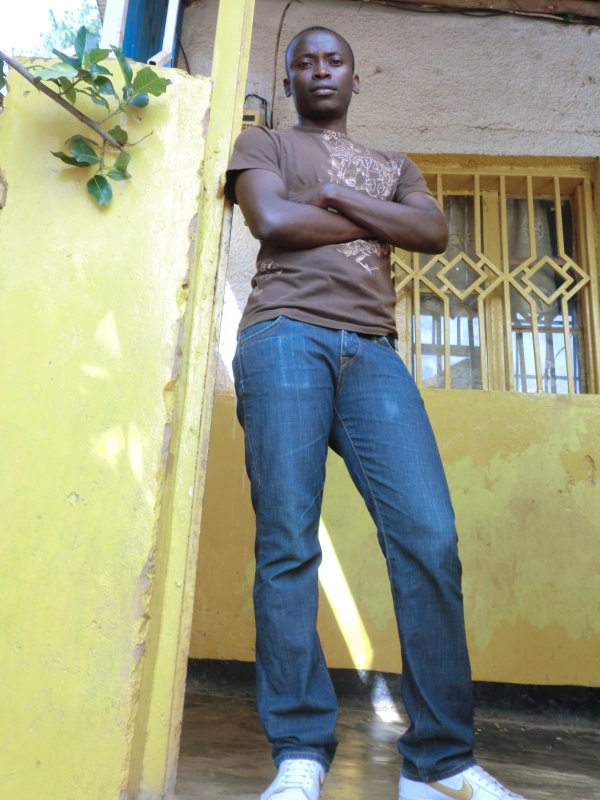 About Modeste: he first came to Kigali three weeks ago to start university, and was staying with us before finding his own place, close to KIE (Kigali Institute of Education): the shopkeeper of a boutique (= a food shop in this case) has a small compound in the back, with about ten small double rooms that he is letting to students. It is a bit crowded, and facilities are basic, but looked friendly, and seems neat and well-organised, including even a set of rules to keep those students in line. After a week of settling in, (he needed to buy quite a lot of things, like a mattrass and sheets, some more clothes and shoes: most of what he had were 'village clothes', and so on) and a week of induction, Modeste's lectures will start on Monday.
About Modeste: he first came to Kigali three weeks ago to start university, and was staying with us before finding his own place, close to KIE (Kigali Institute of Education): the shopkeeper of a boutique (= a food shop in this case) has a small compound in the back, with about ten small double rooms that he is letting to students. It is a bit crowded, and facilities are basic, but looked friendly, and seems neat and well-organised, including even a set of rules to keep those students in line. After a week of settling in, (he needed to buy quite a lot of things, like a mattrass and sheets, some more clothes and shoes: most of what he had were 'village clothes', and so on) and a week of induction, Modeste's lectures will start on Monday.
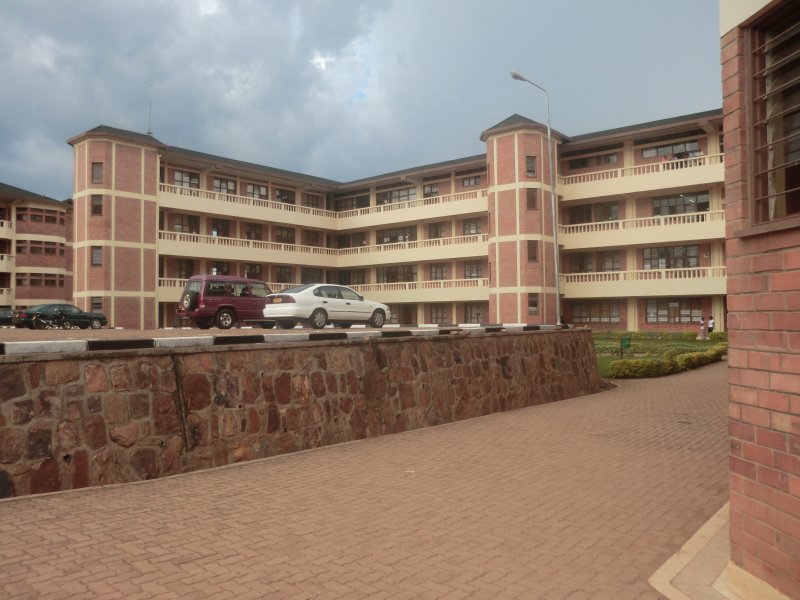
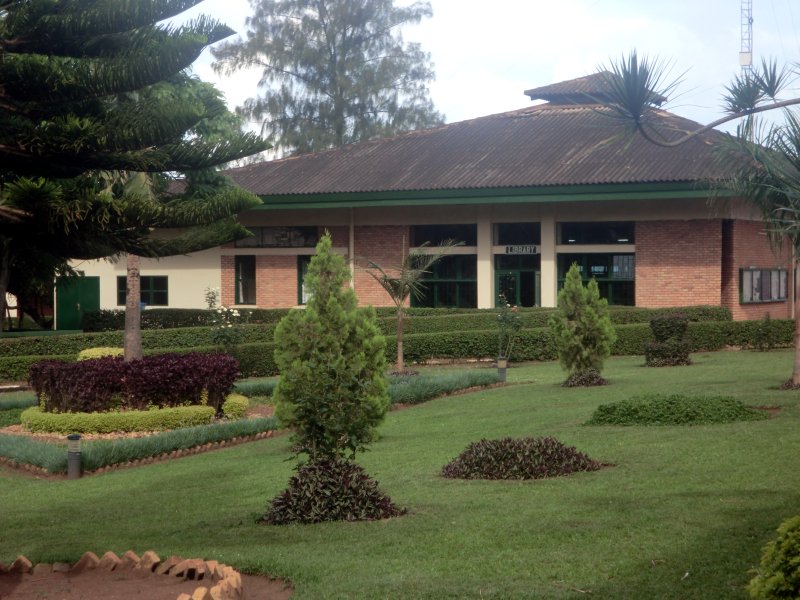
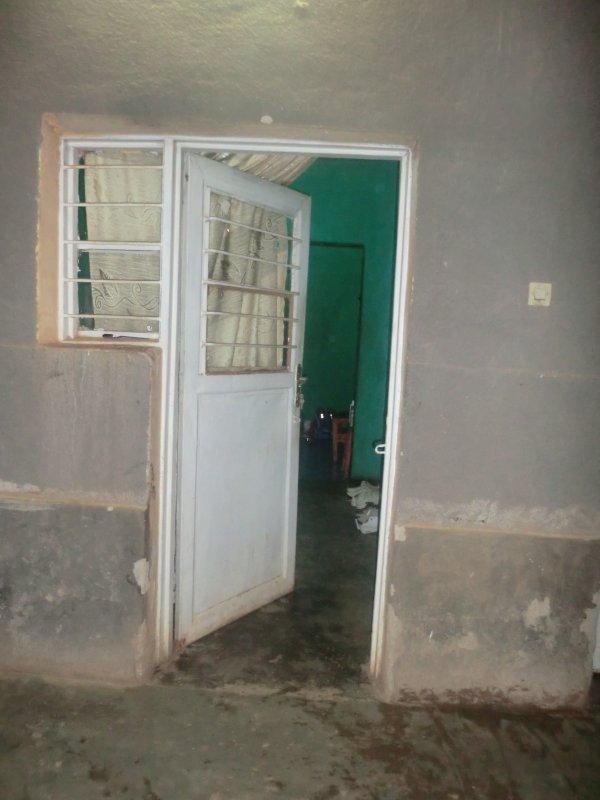
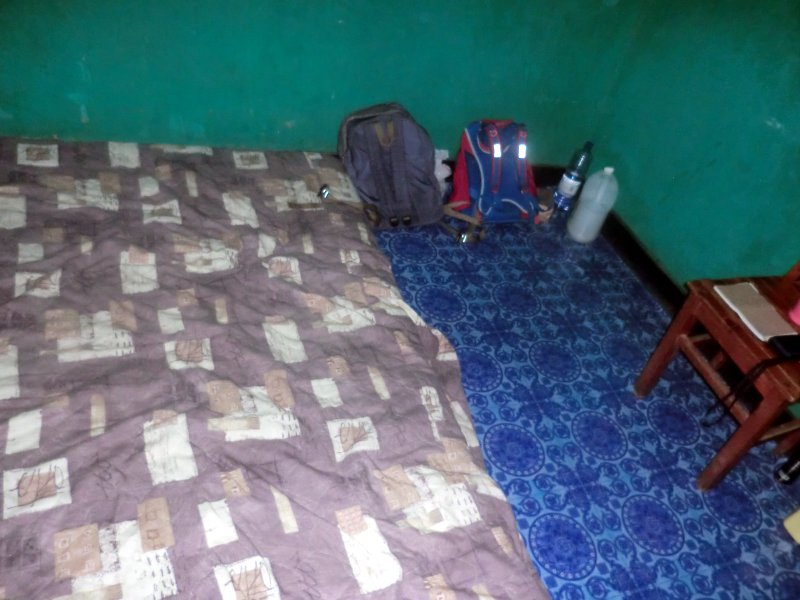
At a friend's place. Where he is studying. Where he is staying.
06 Nov 2011, at the airport in Addis Abeba:After a few rough weeks, with most evenings and weekends taken up with work, I am now on the way to Berlin – or we are: P is sitting next to me, although the immigration official in Kigali gave him a hard time about not having his parents' [?] permission: I think that guy was just bored at 1 a.m., or miscalculated P's age. I had my first glass of wine already, (smuggled out of business class for me) after 13 weeks of beer only. Meanwhile some of our friends are in the middle of taking their O- or A-level exams, L the former and O and R the latter. Even yesterday, less than 12 hours before we left for the airport, I was still registering our next lot of IB candidates: it will be 68 in May, up from 46 this November. (Most, almost all, readers of this non-blog are themselves IB graduates.) But I also had time to meet with the journalist again, Vital, whom I had met at the German Embassy party, and another time for a drink. Nice guy, managing to look after his three-year old son, whom he has taken over from his apparently non-functioning ex-wife.
For me, part of the fun the next three weeks will be to show new things to P, explain things to him. Like the escalator at the airport an hour ago. But I hope he will also feel comfortable doing some things on his own – he will have to fly back to Kigali without me, but by that time he should have enough 'airport experience'. After he has left, I will have ten days or so on my own, except that another Rwandan, someone I know from the US and who is studying in France for a semester, may be coming to visit me in Berlin for a few days. And I am looking forward to meeting Britta, who already stayed at my place last night: this is the first time we meet in Berlin since the time when I was a student and she was living there. And she has of course met P, when she came to Rwanda.
So what am I looking forward to when I go back to Kigali in early January? (– that will be the middle of the second term, which for everyone else is starting this Thursday.) Other than seeing friends again, of course. Well, warmer weather, for one, than we have had the past 13 weeks; I have not been swimming even once! And a more normal time at school, when we won't have two grade 12 classes, nor a Five-Year Self-study Questionnaire from the IB to complete, plus supporting documents.
P.S.I have thought a bit more about the question Andrew asked when he was in Kigali: with Rwanda having hardly any industry, nor any raw materials to speak of, and with the foreign funding mostly not being misappropriated, where does the money come from that pays for the mansions in some parts of town and the SUVs one sees everywhere? (– as well as, perhaps, the school fees at Green Hills Academy.) The answer, I now think, may be connected with an obvious fact of life in Rwanda, that most things are considerably more expensive than in near-by Kenya, Uganda or Tanzania: it has occurred to me that if many things are 20% more expensive, but the additional transport cost is 10%, say, then the extra 10% charged for much of what is sold in the country would be enough to explain the wealth of some people; so that what is going on is a re-distribution of income from the poor to the rich, (even if the rich also pay those higher prices, of course.)

 A lot more fun, and useful, than staff training that I had undergone in the past, this actually addressed teachers' problems in the classroom. Came home late twice that week, after a dinner with the guests and a party on Friday, which included a performance by the second best traditional dance group in the country, which is run by one of our teachers. What is striking about many of the dances, (as I think I have noted in another place) especially by the men, is the way the upper body floats over a stomping and jumping lower body and legs. – Having avoided beer for the whole of the break, I now have it occasionally, as usually the only alcohol on offer.
A lot more fun, and useful, than staff training that I had undergone in the past, this actually addressed teachers' problems in the classroom. Came home late twice that week, after a dinner with the guests and a party on Friday, which included a performance by the second best traditional dance group in the country, which is run by one of our teachers. What is striking about many of the dances, (as I think I have noted in another place) especially by the men, is the way the upper body floats over a stomping and jumping lower body and legs. – Having avoided beer for the whole of the break, I now have it occasionally, as usually the only alcohol on offer. I went swimming for the first time today, it has been a bit cooler and wetter than it was last year, and was pleased that I had no problems, despite my bike accident in Berlin just over two months ago (which I suppose everyone who reads this page knows about.)
I went swimming for the first time today, it has been a bit cooler and wetter than it was last year, and was pleased that I had no problems, despite my bike accident in Berlin just over two months ago (which I suppose everyone who reads this page knows about.)
 Britta arrived the week before last, and was picked up by B at the airport, as I was at school, (chairing meetings, in fact: but it was also nice that she first met a friend of mine separately from me.) She came to school for a day, came swimming at the Mille Collines with me, went to the market on her own, cooked some of the meals for us (including potatoes and eggs in Senfsosse: mustard was a new flavour to the other two) and she met some of my friends here, but then on Monday last week she took off on her own – by now she has already spent more time in Rwanda outside Kigali than I have! One reason she came, and wanted to spend six weeks here, was to spend time by herself, away from where she has been before (– the trip is paid for by the commune, so she has been taking pictures partly to be able to share her experiences with the others after she has returned. These pictures are hers.)
Britta arrived the week before last, and was picked up by B at the airport, as I was at school, (chairing meetings, in fact: but it was also nice that she first met a friend of mine separately from me.) She came to school for a day, came swimming at the Mille Collines with me, went to the market on her own, cooked some of the meals for us (including potatoes and eggs in Senfsosse: mustard was a new flavour to the other two) and she met some of my friends here, but then on Monday last week she took off on her own – by now she has already spent more time in Rwanda outside Kigali than I have! One reason she came, and wanted to spend six weeks here, was to spend time by herself, away from where she has been before (– the trip is paid for by the commune, so she has been taking pictures partly to be able to share her experiences with the others after she has returned. These pictures are hers.)

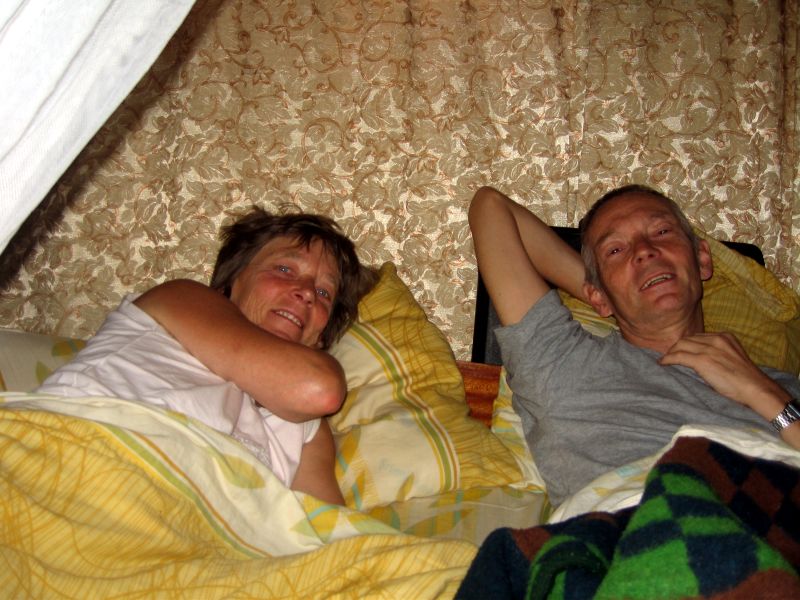
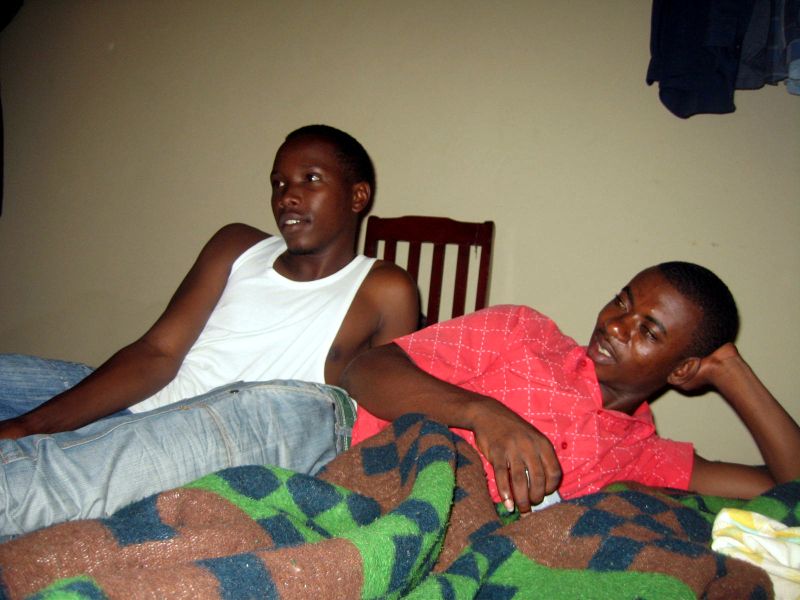
 There are other areas too, apart from cutting down on the spending on the education of genocide survivors, where it seems to me the government's policy is heavy-handed, even unfair. Officials of the local administrations have been going around in the villages, destroying the traditional thatch or banana-leaf roofs that many buildings still have. If the building was a family's residence, assistance was available to put on metal sheeting instead, but if it was just the outside kitchen, as in the case of P's grandfather, there was no compensation at all. Not only does such a policy reflect a very limited view of development, as if development meant becoming 'modern' and Western rather than having to do with freedom and quality of life; the top-down approach also only changes appearances, and can lead to genuine hardship and give rise to resentment. (I may of course have misunderstood the policy and have been misinformed about its implementation – but if I have, despite trying to find out and wanting to believe the best, then there is still a serious problem.)
There are other areas too, apart from cutting down on the spending on the education of genocide survivors, where it seems to me the government's policy is heavy-handed, even unfair. Officials of the local administrations have been going around in the villages, destroying the traditional thatch or banana-leaf roofs that many buildings still have. If the building was a family's residence, assistance was available to put on metal sheeting instead, but if it was just the outside kitchen, as in the case of P's grandfather, there was no compensation at all. Not only does such a policy reflect a very limited view of development, as if development meant becoming 'modern' and Western rather than having to do with freedom and quality of life; the top-down approach also only changes appearances, and can lead to genuine hardship and give rise to resentment. (I may of course have misunderstood the policy and have been misinformed about its implementation – but if I have, despite trying to find out and wanting to believe the best, then there is still a serious problem.)
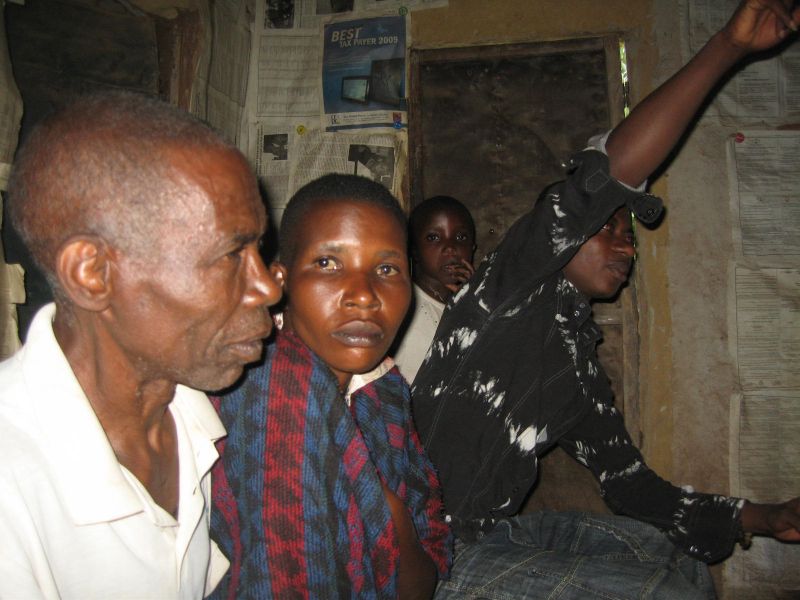
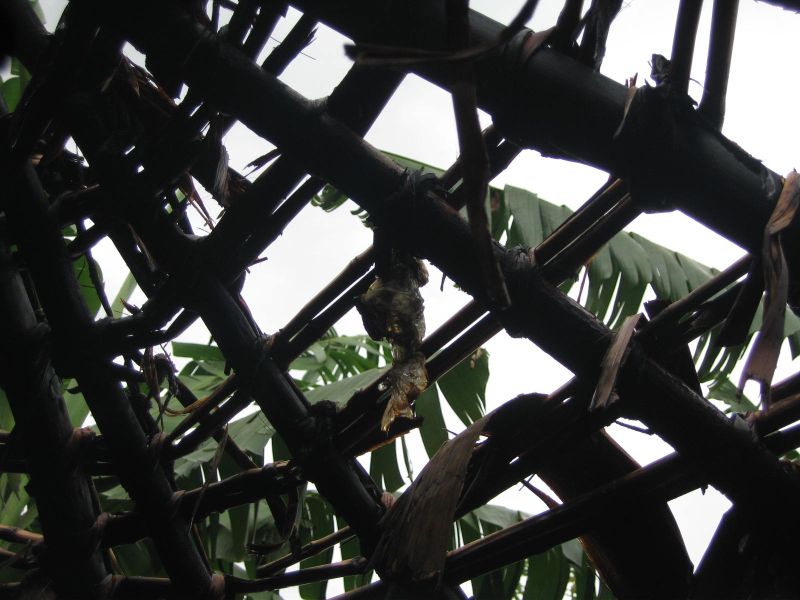

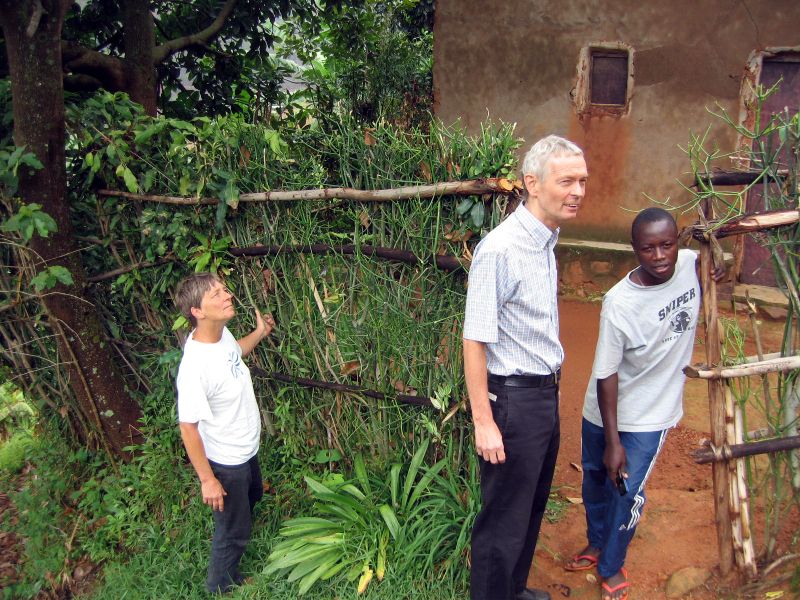
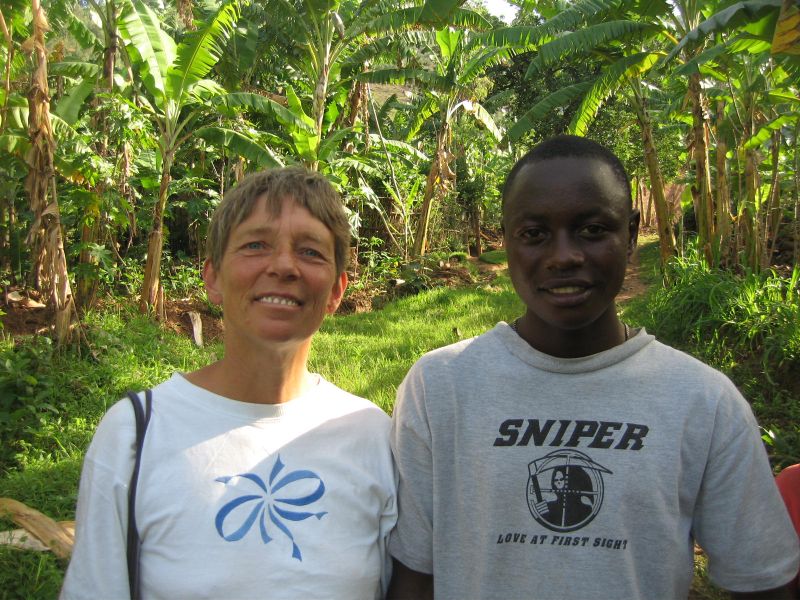


 The other sad thing, smaller in a way but also larger: Modeste from the bar was away for a few days because of trouble at home. I have mentioned the Gacaca courts before, an old tradition used recently to help deal with the consequences of the genocide. Apparently his father had been before the courts some years ago, and been found not guilty. But recently a neighbour had lost a case, relating to property that had been taken from the home of a genocide victim in the village, and had been told to pay RFr 2,000,000. This they had no means of paying on their own, without selling all their land, so they implicated other people who they said had been there, so as to divide the sum they had been made to pay, and one of these was M's father, who suddenly found himself liable for RFr 120,000 (= $ 200) and part of his land confiscated because he could not raise that kind of sum. Sorry. Sadly, (for various reasons) the bar where he was working sent M away a few days later, unrelatedly and not for anything he had done wrong. After checking with P and B that the story was coherent and plausible, we had M stay until he left the next day, and I did help out.
The other sad thing, smaller in a way but also larger: Modeste from the bar was away for a few days because of trouble at home. I have mentioned the Gacaca courts before, an old tradition used recently to help deal with the consequences of the genocide. Apparently his father had been before the courts some years ago, and been found not guilty. But recently a neighbour had lost a case, relating to property that had been taken from the home of a genocide victim in the village, and had been told to pay RFr 2,000,000. This they had no means of paying on their own, without selling all their land, so they implicated other people who they said had been there, so as to divide the sum they had been made to pay, and one of these was M's father, who suddenly found himself liable for RFr 120,000 (= $ 200) and part of his land confiscated because he could not raise that kind of sum. Sorry. Sadly, (for various reasons) the bar where he was working sent M away a few days later, unrelatedly and not for anything he had done wrong. After checking with P and B that the story was coherent and plausible, we had M stay until he left the next day, and I did help out.  Apparently the Gacaca courts have only been about 70% good and 30% bad – not a good enough record, I feel. I wonder if the Truth and Reconciliation Commission did better in South Africa. M seems to be a good guy, "humble", to use P's word, and we have invited him to come to visit for a weekend in April or May.
Apparently the Gacaca courts have only been about 70% good and 30% bad – not a good enough record, I feel. I wonder if the Truth and Reconciliation Commission did better in South Africa. M seems to be a good guy, "humble", to use P's word, and we have invited him to come to visit for a weekend in April or May.
 [I updated this paragraph two weeks later, after the government had published the requirements for gaining a loan to cover the tuition fees at a university, which still leaves the board and lodging, of about RFr 350,000 (= $ 600) to be covered.] So B and M both finished school last year, and did very well. Next year, i.e. from January, both want to go to university, and both have asked me, separately, if I could pay for them, or if I know someone who could. M's main subjects were Chemistry and Biology; he did well enough to be offered a government loan to study at KIE, the Kigali Institute of Education, which is the best teacher training institution in the country – but he is a lot keener to study nursing or medicine, and he has mentioned a 4-year nursing course in Burundi, to the South of Rwanda, costing RFr 700,000 (= $ 1200, including board and lodging) a year. B's option was electrics, and so he wants to study engineering. He got the second-highest result in his class of about 30, but still missed out on a loan. A course for him in this country could be around RFr 1,500,000 (= $ 2500) per year. But he is really keen to study abroad, like in India or Malaysia, where the total cost, at decent places, would be about $ 5000 per year. (He knows that is a long shot!)
[I updated this paragraph two weeks later, after the government had published the requirements for gaining a loan to cover the tuition fees at a university, which still leaves the board and lodging, of about RFr 350,000 (= $ 600) to be covered.] So B and M both finished school last year, and did very well. Next year, i.e. from January, both want to go to university, and both have asked me, separately, if I could pay for them, or if I know someone who could. M's main subjects were Chemistry and Biology; he did well enough to be offered a government loan to study at KIE, the Kigali Institute of Education, which is the best teacher training institution in the country – but he is a lot keener to study nursing or medicine, and he has mentioned a 4-year nursing course in Burundi, to the South of Rwanda, costing RFr 700,000 (= $ 1200, including board and lodging) a year. B's option was electrics, and so he wants to study engineering. He got the second-highest result in his class of about 30, but still missed out on a loan. A course for him in this country could be around RFr 1,500,000 (= $ 2500) per year. But he is really keen to study abroad, like in India or Malaysia, where the total cost, at decent places, would be about $ 5000 per year. (He knows that is a long shot!) 08 May 2011:This weekend we went to P's and B's village again, I stayed at L's house this time; he was happy, because he is always there on his own. On Sunday it rained a few times, heavily, so we spent a long time on the bed talking, and practising a bit from some of his notebooks: he has his O-level exams in November and his whole class is already revising. Fortunately the last downpour stopped in time for the ceremony that was held seven weeks after the death in a motorbike accident of B's brother, which was the reason that we went to the village this weekend.
08 May 2011:This weekend we went to P's and B's village again, I stayed at L's house this time; he was happy, because he is always there on his own. On Sunday it rained a few times, heavily, so we spent a long time on the bed talking, and practising a bit from some of his notebooks: he has his O-level exams in November and his whole class is already revising. Fortunately the last downpour stopped in time for the ceremony that was held seven weeks after the death in a motorbike accident of B's brother, which was the reason that we went to the village this weekend.

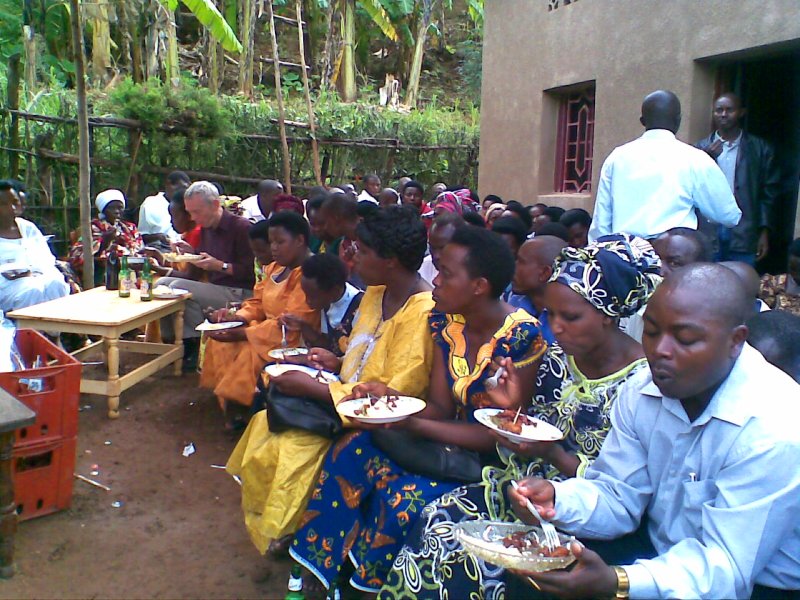
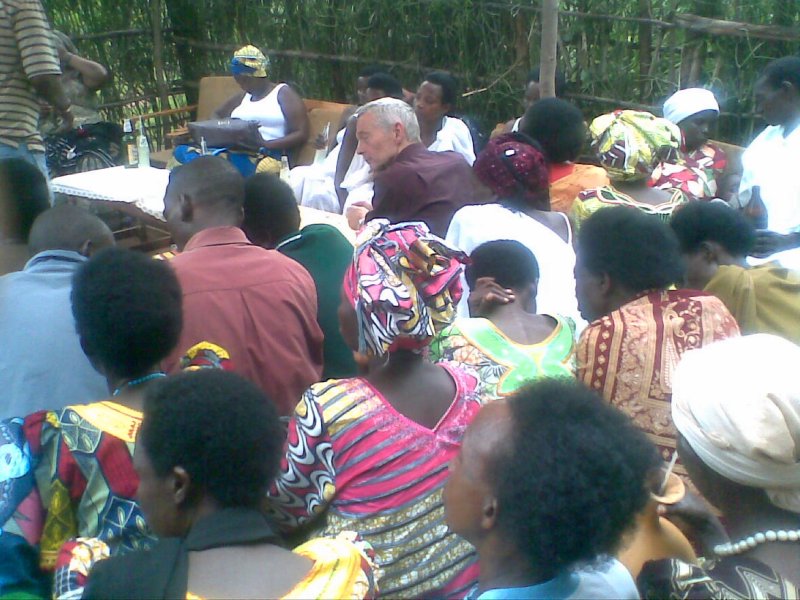
 I was placed in the front, as usual, this time with L next to me to 'look after the honoured guest'. And for women and children there is some traditional medicine, (provided by P's grandfather, who walked away, in exchange, with a calabash of banana beer) to ward off any evil influences. As one of the speakers said, apparently, "this is not the end of mourning, but we dry our tears for a moment for this event." A sad occasion, but still a good weekend.
I was placed in the front, as usual, this time with L next to me to 'look after the honoured guest'. And for women and children there is some traditional medicine, (provided by P's grandfather, who walked away, in exchange, with a calabash of banana beer) to ward off any evil influences. As one of the speakers said, apparently, "this is not the end of mourning, but we dry our tears for a moment for this event." A sad occasion, but still a good weekend.

 Again, not my style of picture, but the formal kind, taken in a studio, that is popular here to commemorate a special occasion – in this case the (almost-)double-birthday of P and R.
Again, not my style of picture, but the formal kind, taken in a studio, that is popular here to commemorate a special occasion – in this case the (almost-)double-birthday of P and R.


 When I came back, I found that the stops of the 'taxis' had been moved out of the city centre, to places some 5 or 10 minutes' walk away. While this doesn't affect people who just need to change taxi, it is a hassle if one has business in town; moreover, in one place, when it rains, there is no cover along the road.
When I came back, I found that the stops of the 'taxis' had been moved out of the city centre, to places some 5 or 10 minutes' walk away. While this doesn't affect people who just need to change taxi, it is a hassle if one has business in town; moreover, in one place, when it rains, there is no cover along the road. Of course the centre, around the recently completed tallest building, is less hectic now. I have asked people if there had been any prior public debate, but apparently not – I am afraid it feels like a decision by people who all have cars, or own shares in that building. :-( But I have only picked up a few mutterings.
Of course the centre, around the recently completed tallest building, is less hectic now. I have asked people if there had been any prior public debate, but apparently not – I am afraid it feels like a decision by people who all have cars, or own shares in that building. :-( But I have only picked up a few mutterings. About Modeste: he first came to Kigali three weeks ago to start university, and was staying with us before finding his own place, close to KIE (Kigali Institute of Education): the shopkeeper of a boutique (= a food shop in this case) has a small compound in the back, with about ten small double rooms that he is letting to students. It is a bit crowded, and facilities are basic, but looked friendly, and seems neat and well-organised, including even a set of rules to keep those students in line. After a week of settling in, (he needed to buy quite a lot of things, like a mattrass and sheets, some more clothes and shoes: most of what he had were 'village clothes', and so on) and a week of induction, Modeste's lectures will start on Monday.
About Modeste: he first came to Kigali three weeks ago to start university, and was staying with us before finding his own place, close to KIE (Kigali Institute of Education): the shopkeeper of a boutique (= a food shop in this case) has a small compound in the back, with about ten small double rooms that he is letting to students. It is a bit crowded, and facilities are basic, but looked friendly, and seems neat and well-organised, including even a set of rules to keep those students in line. After a week of settling in, (he needed to buy quite a lot of things, like a mattrass and sheets, some more clothes and shoes: most of what he had were 'village clothes', and so on) and a week of induction, Modeste's lectures will start on Monday.



